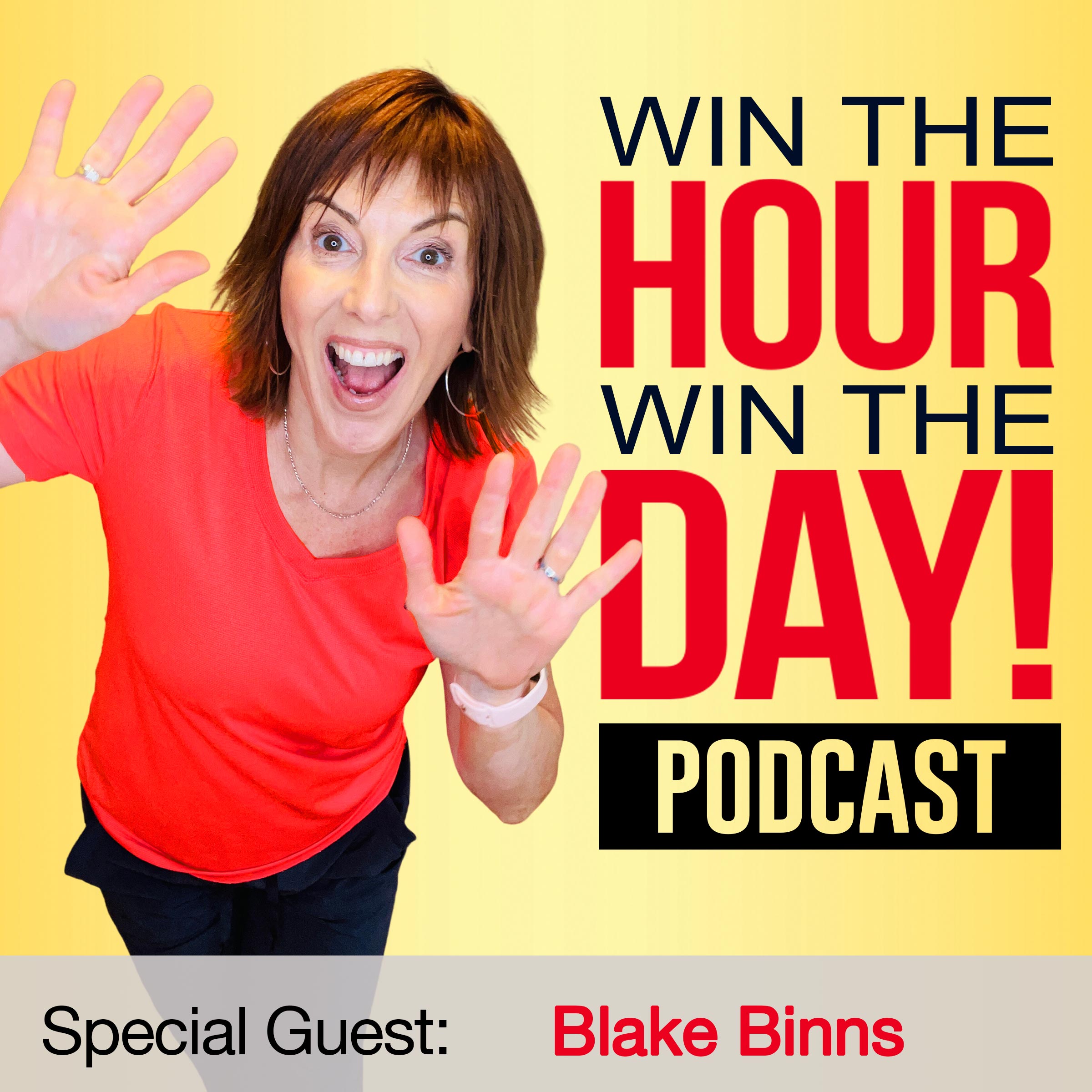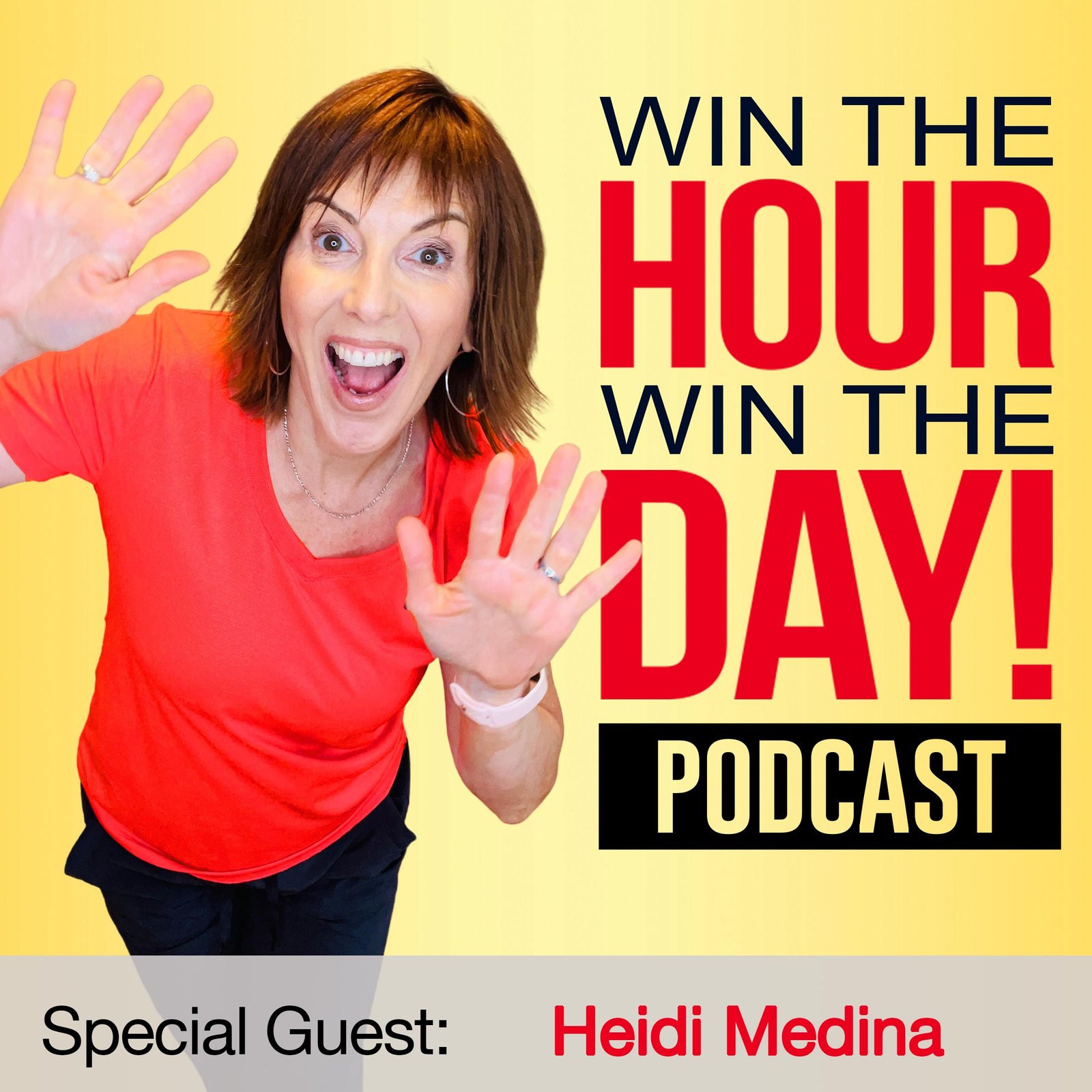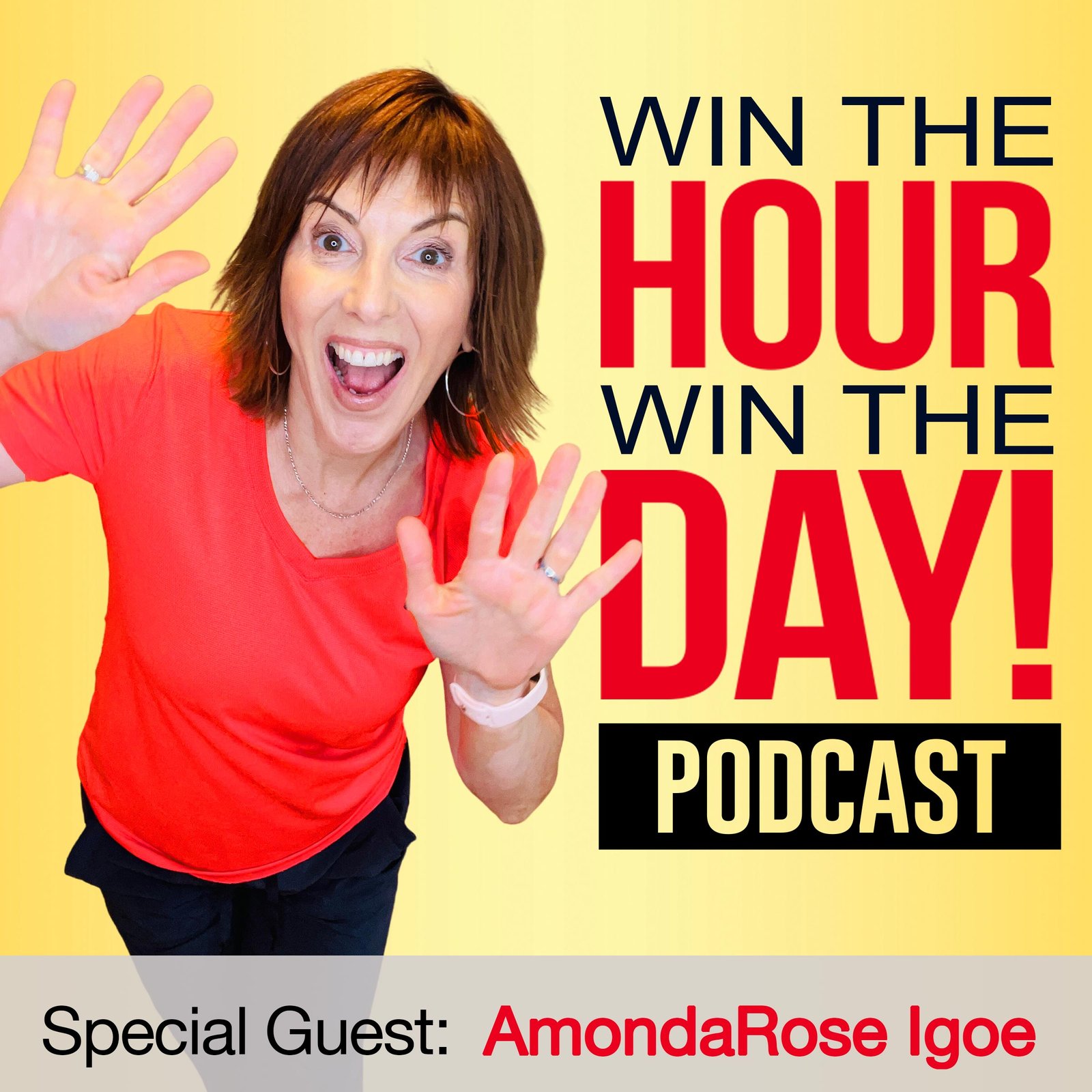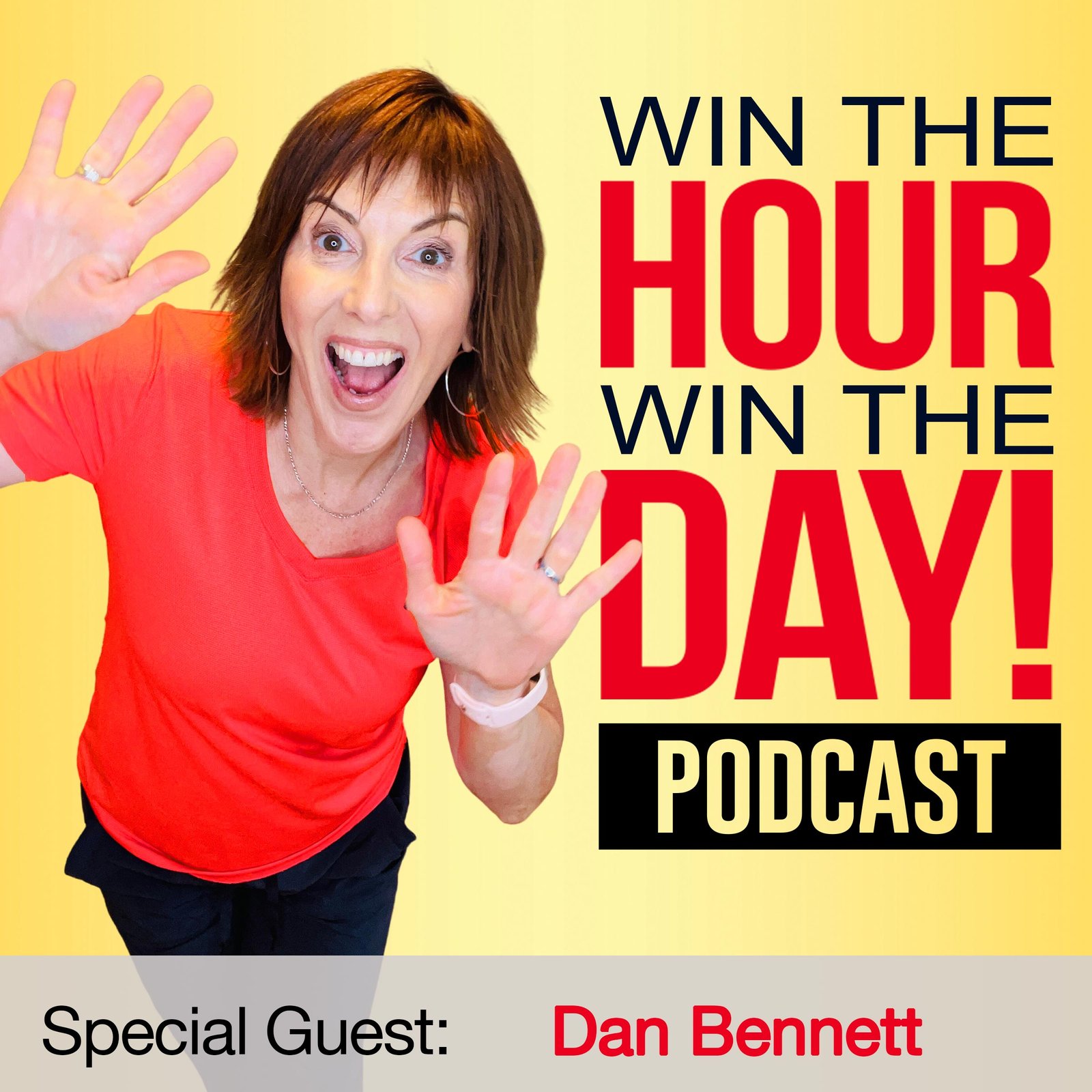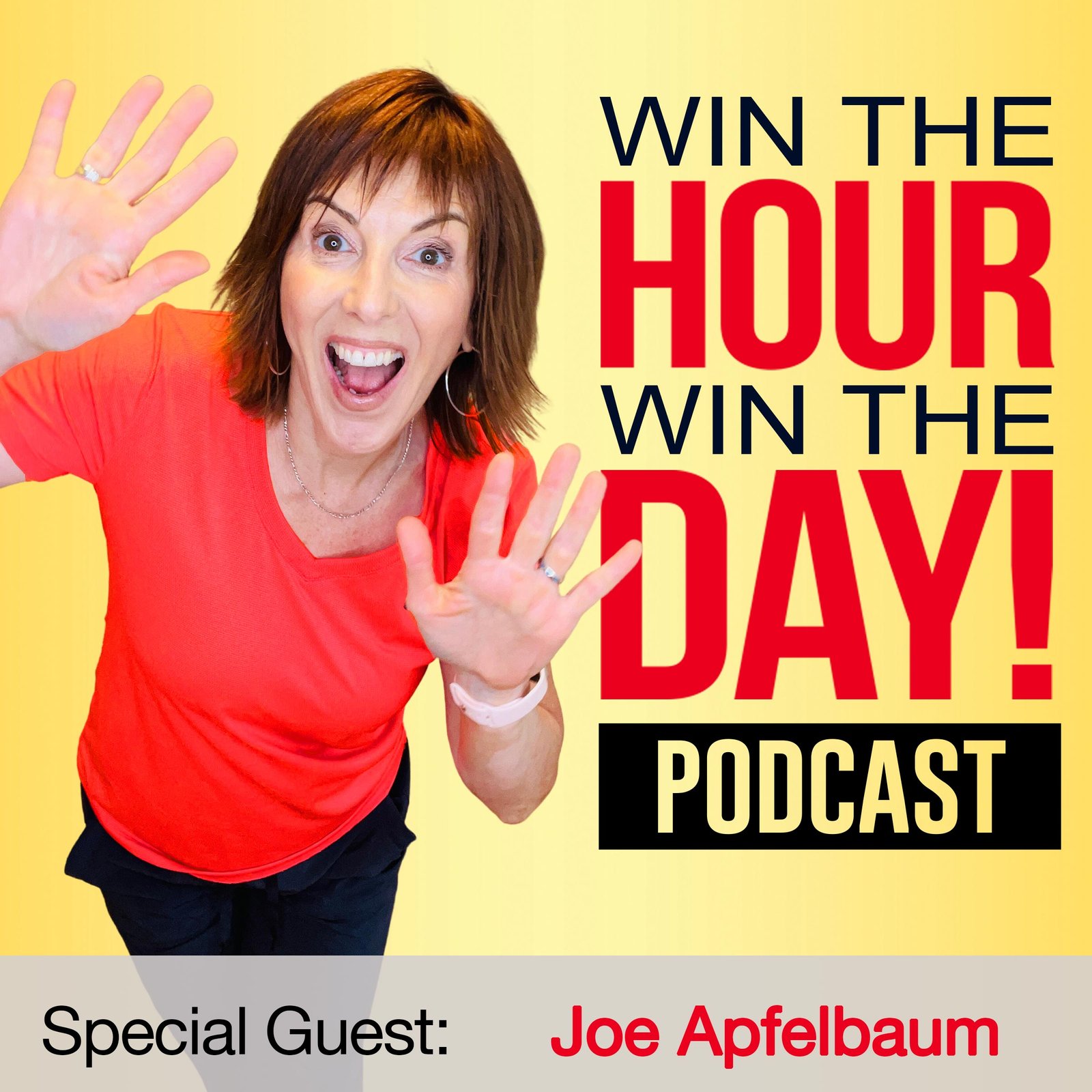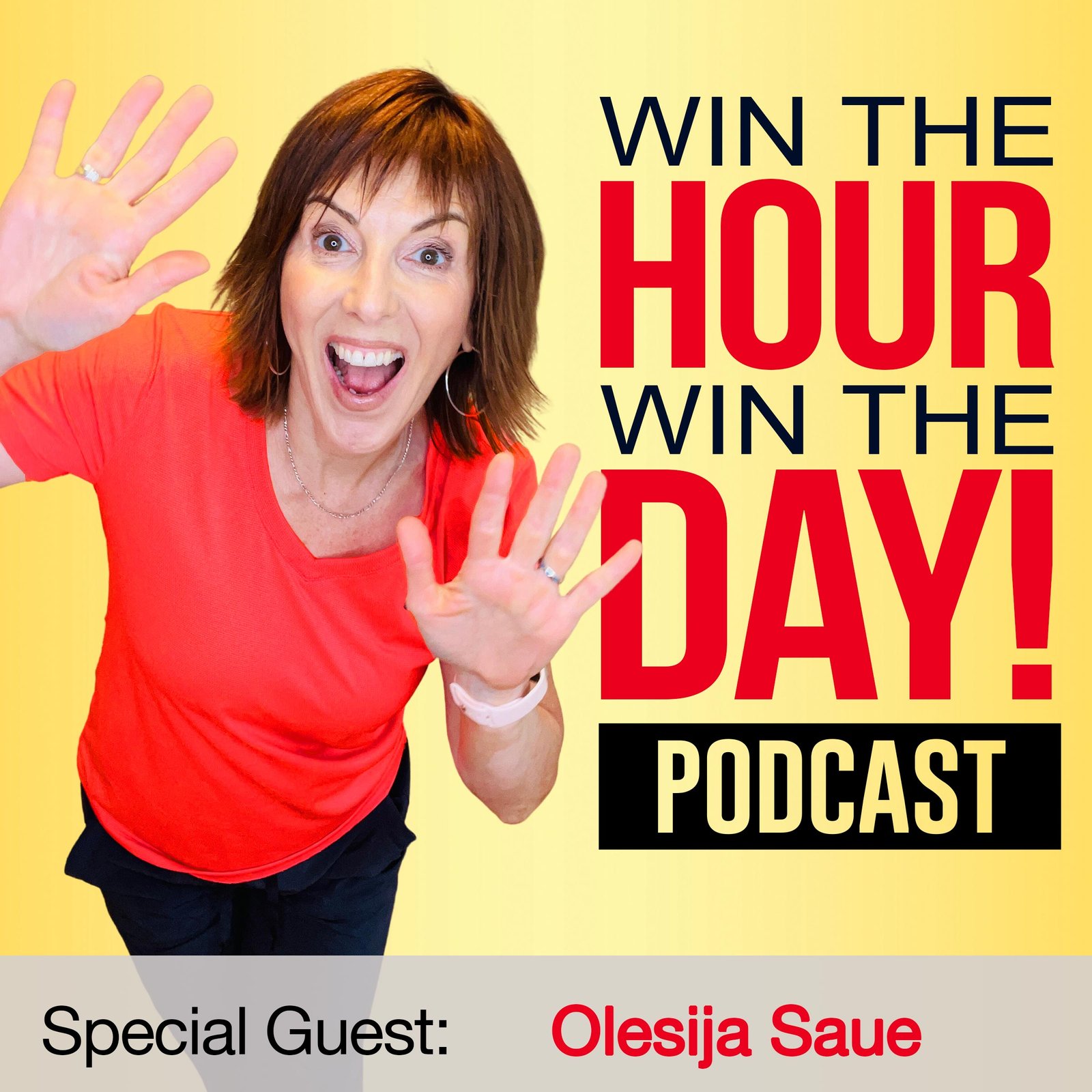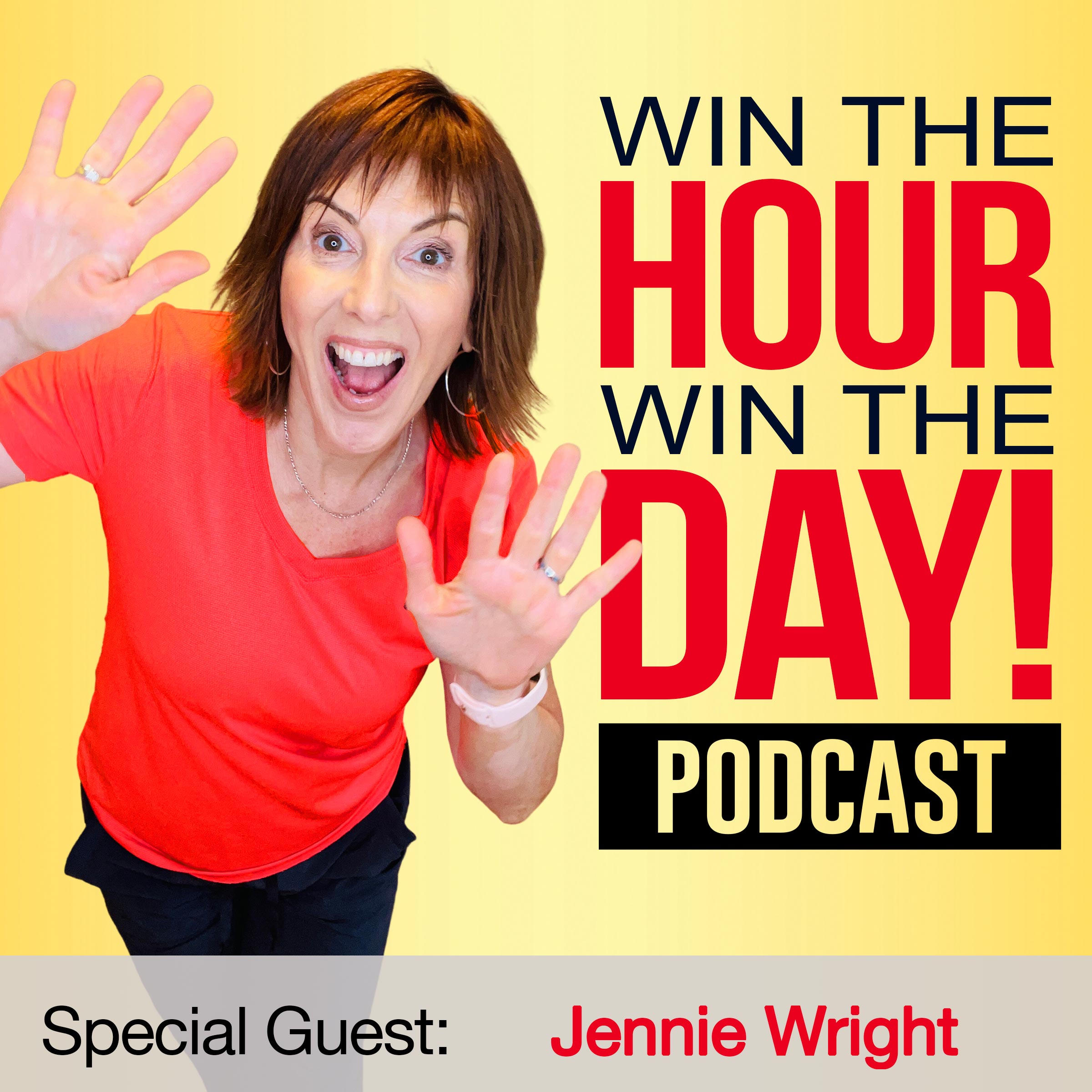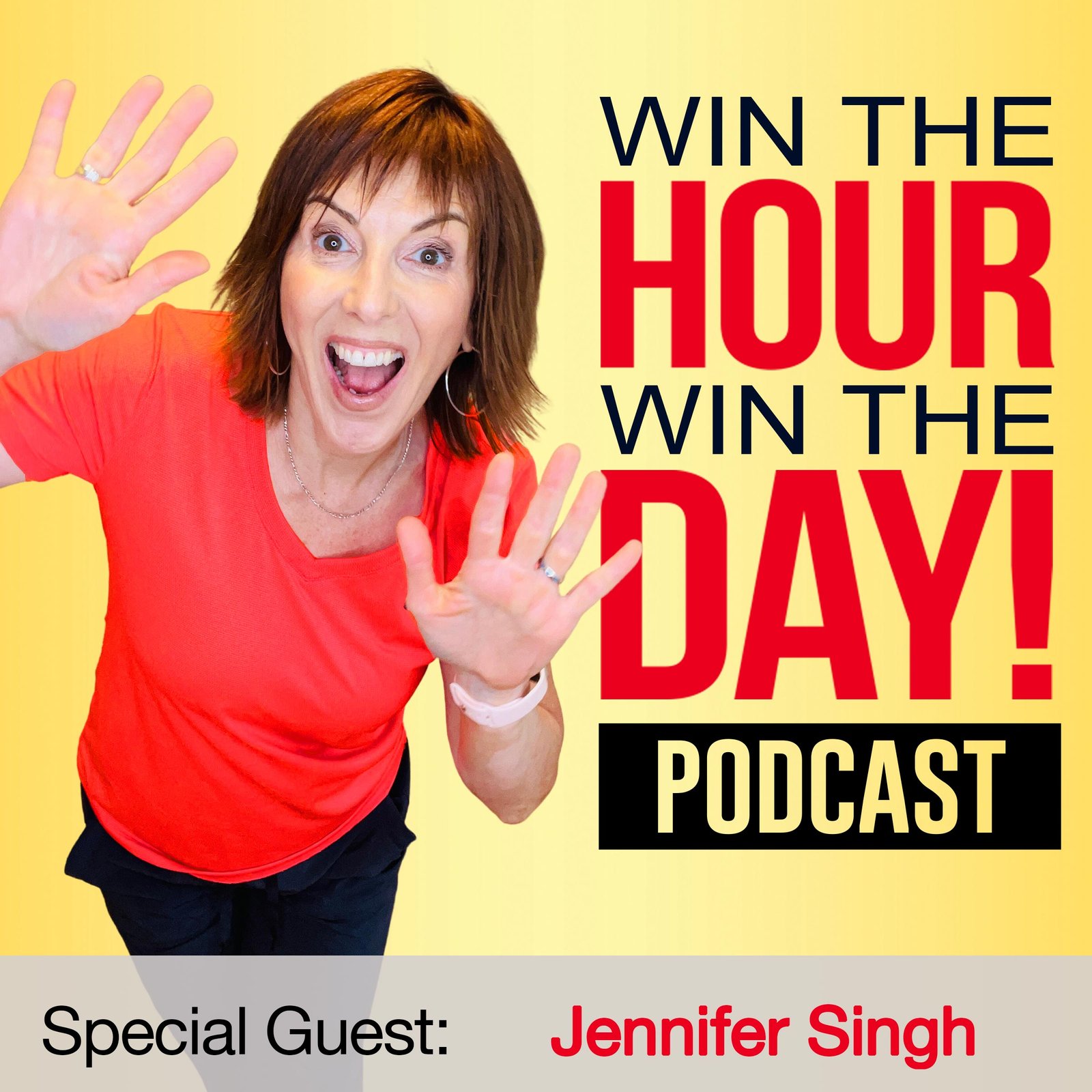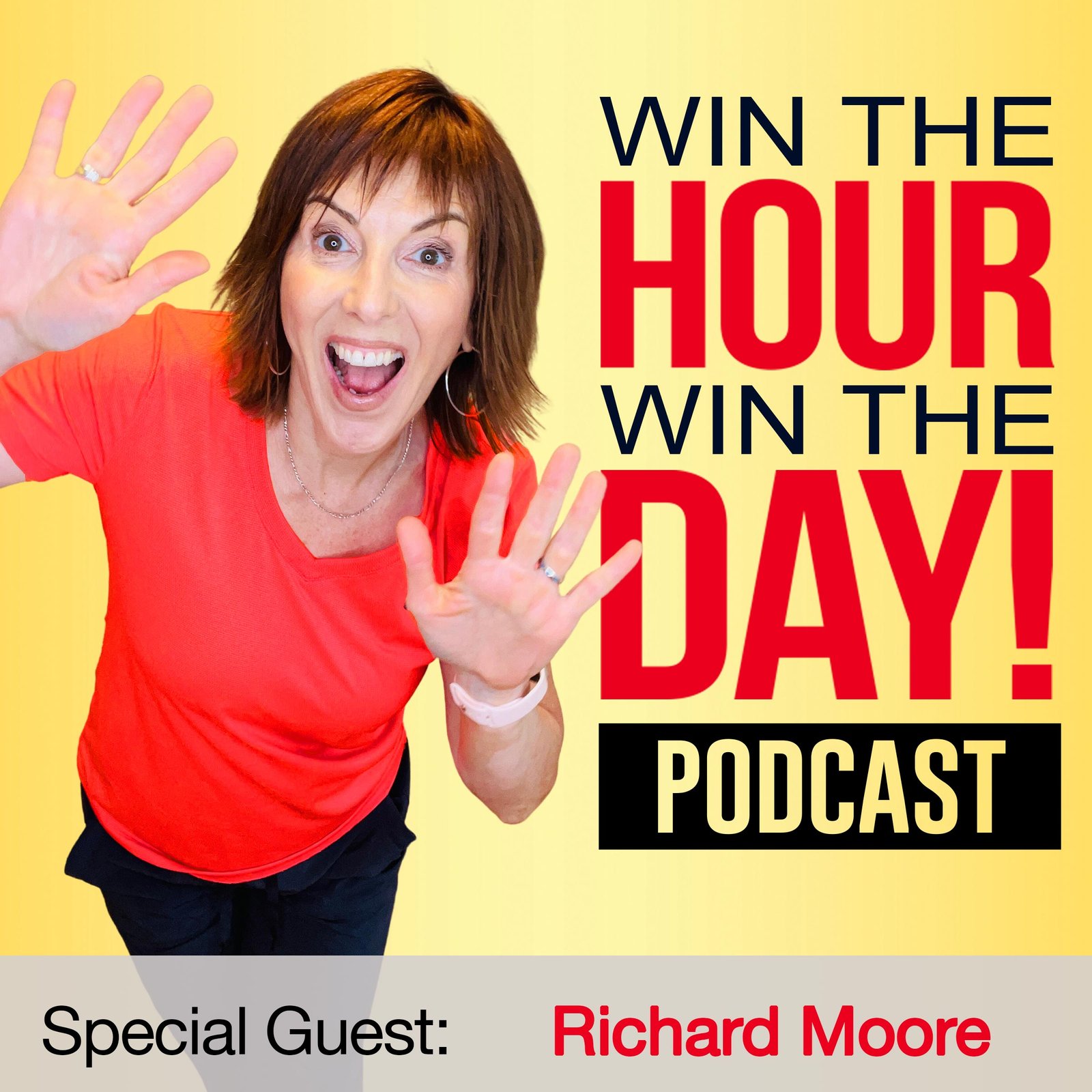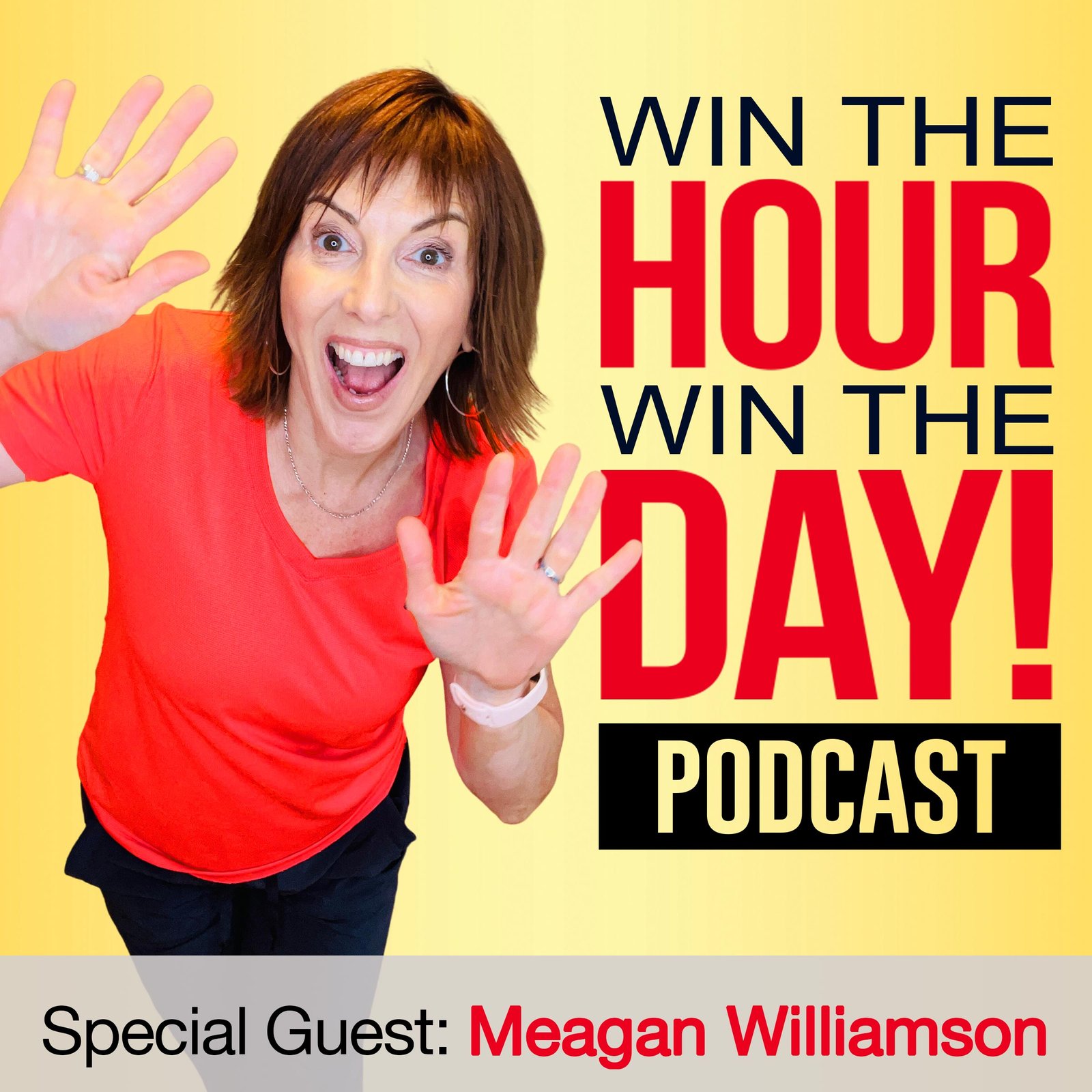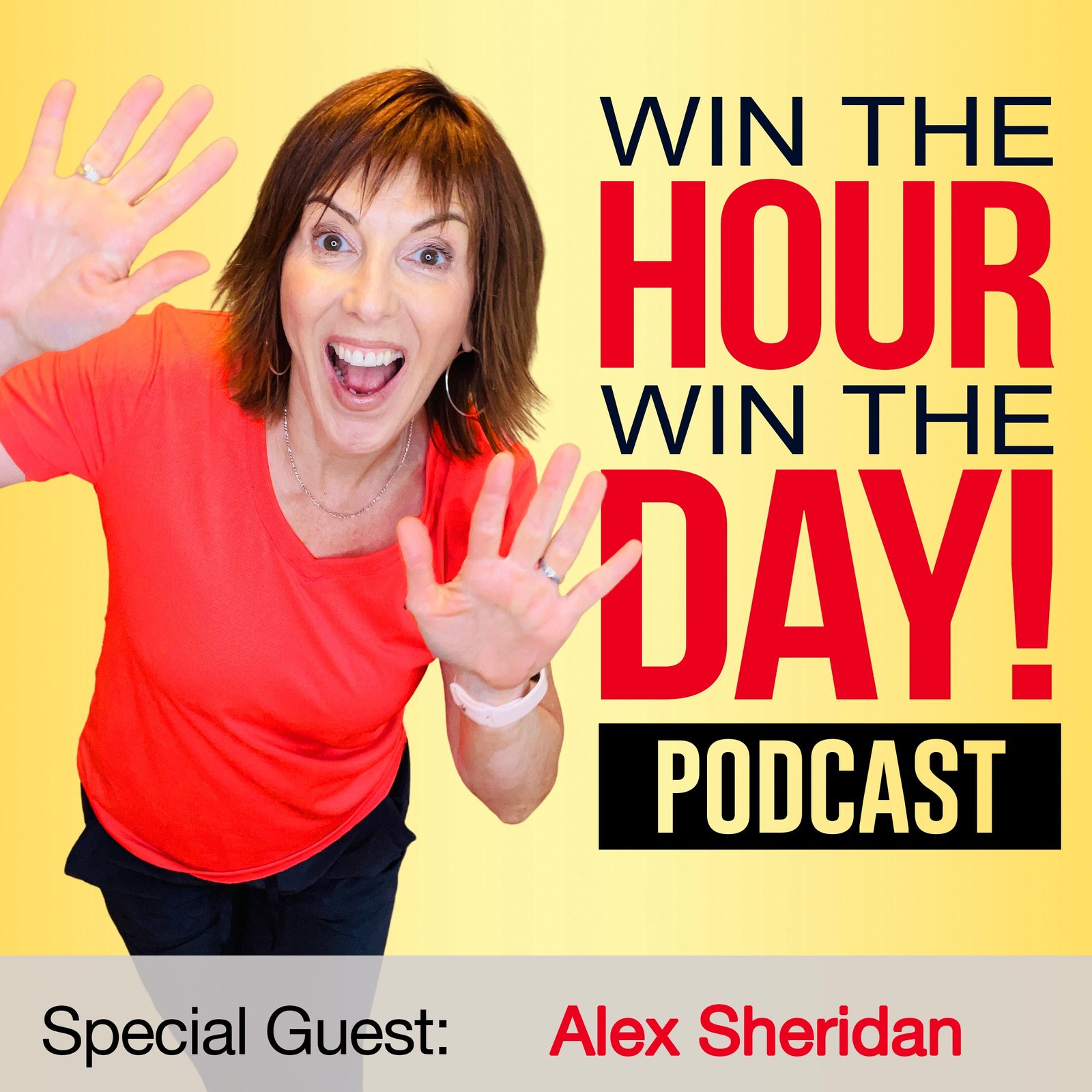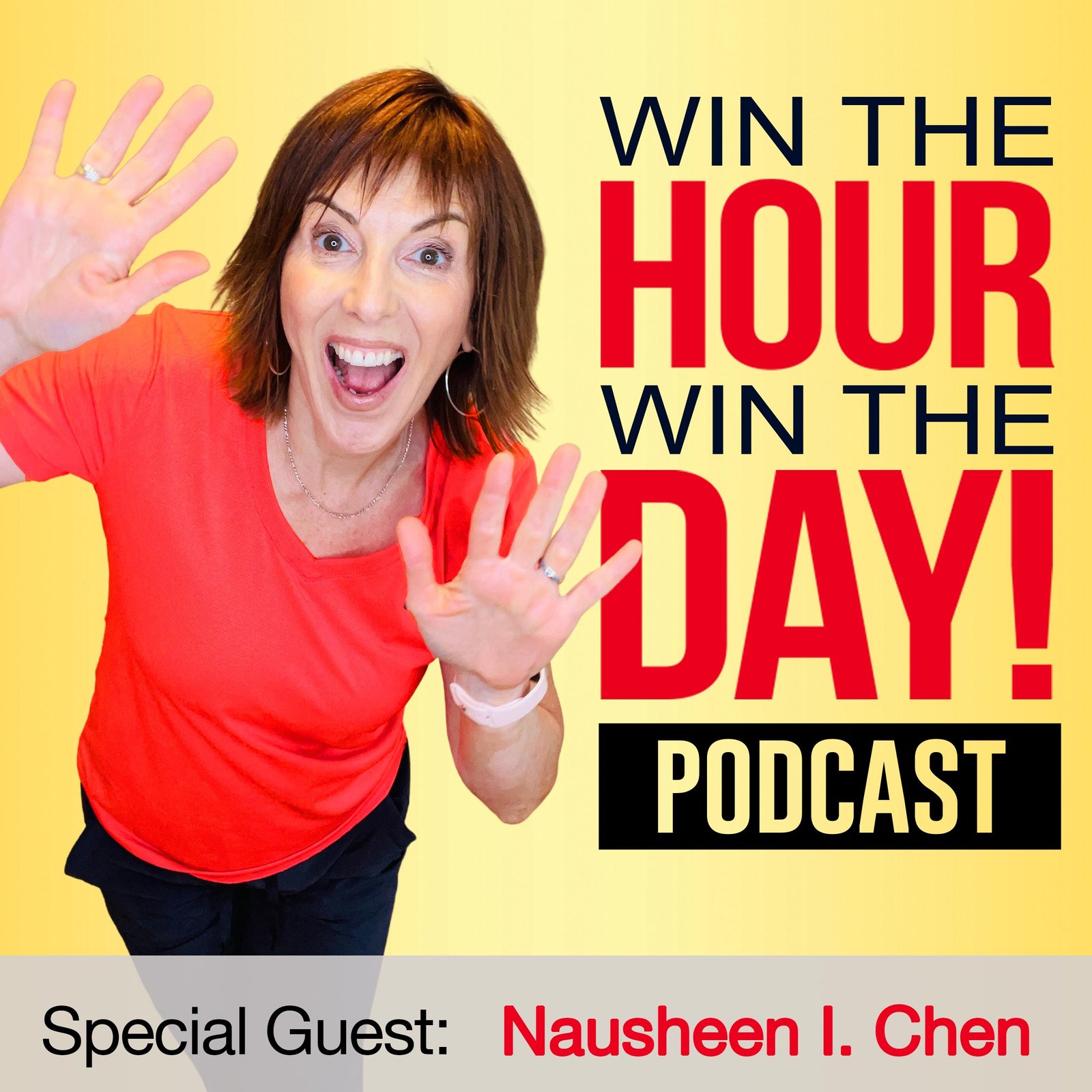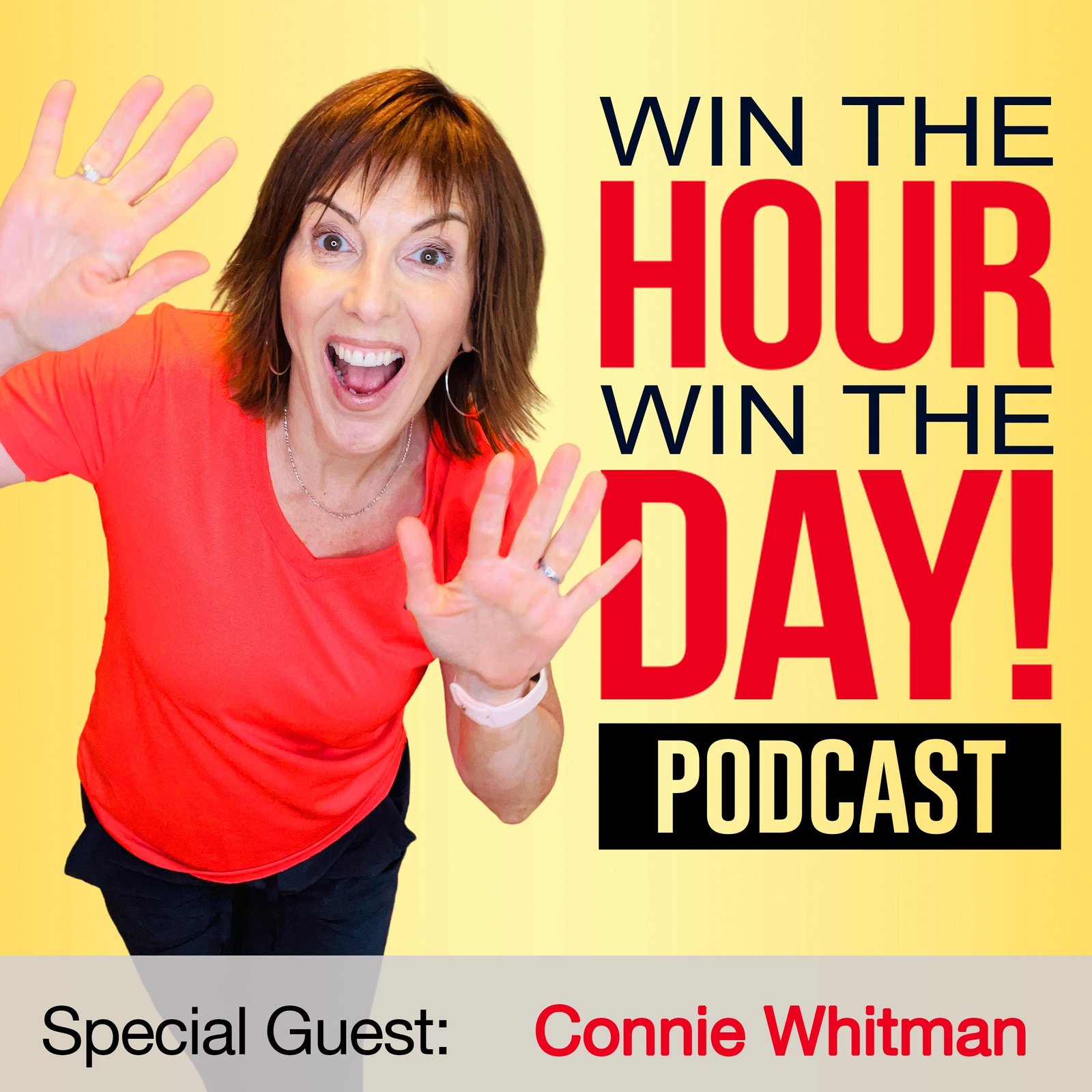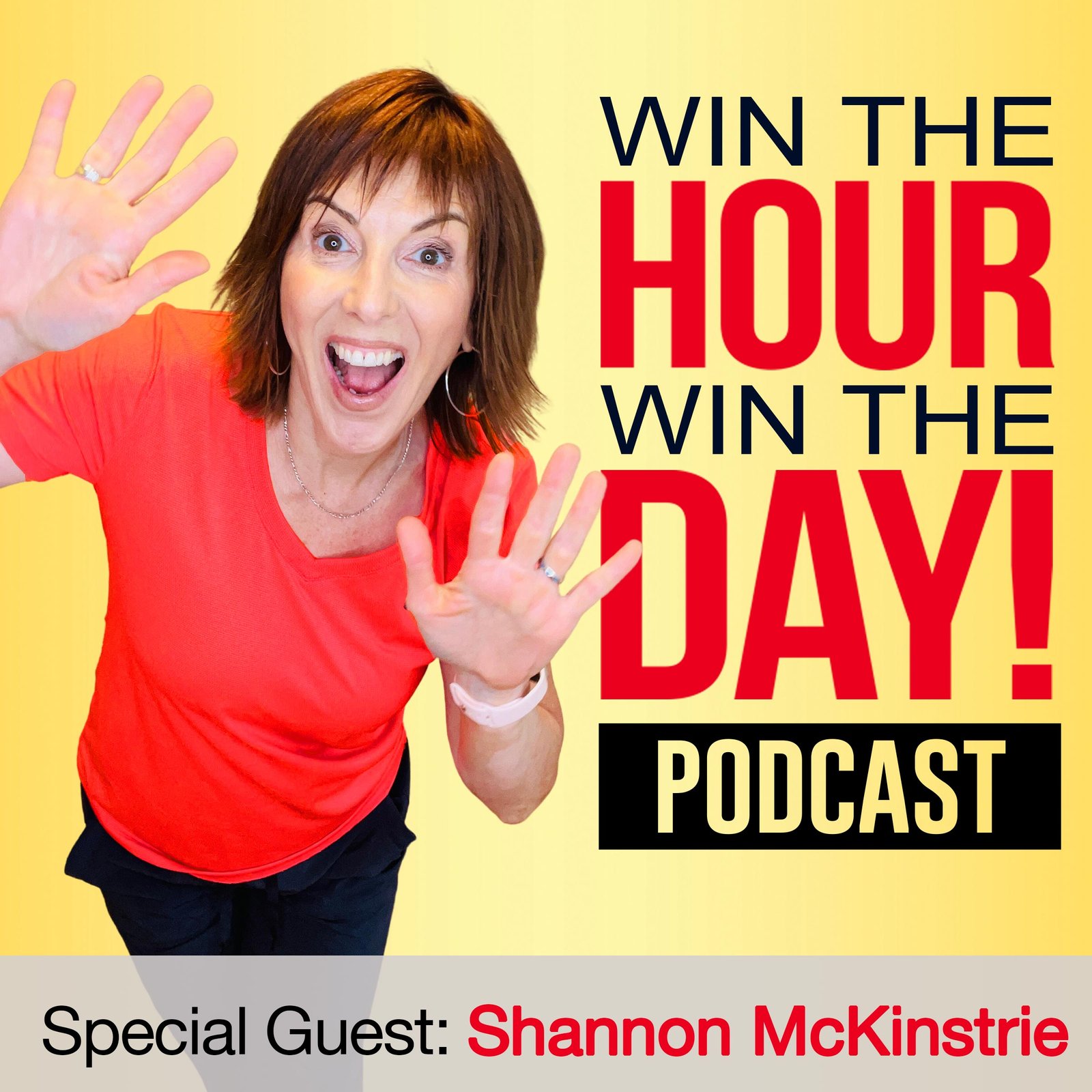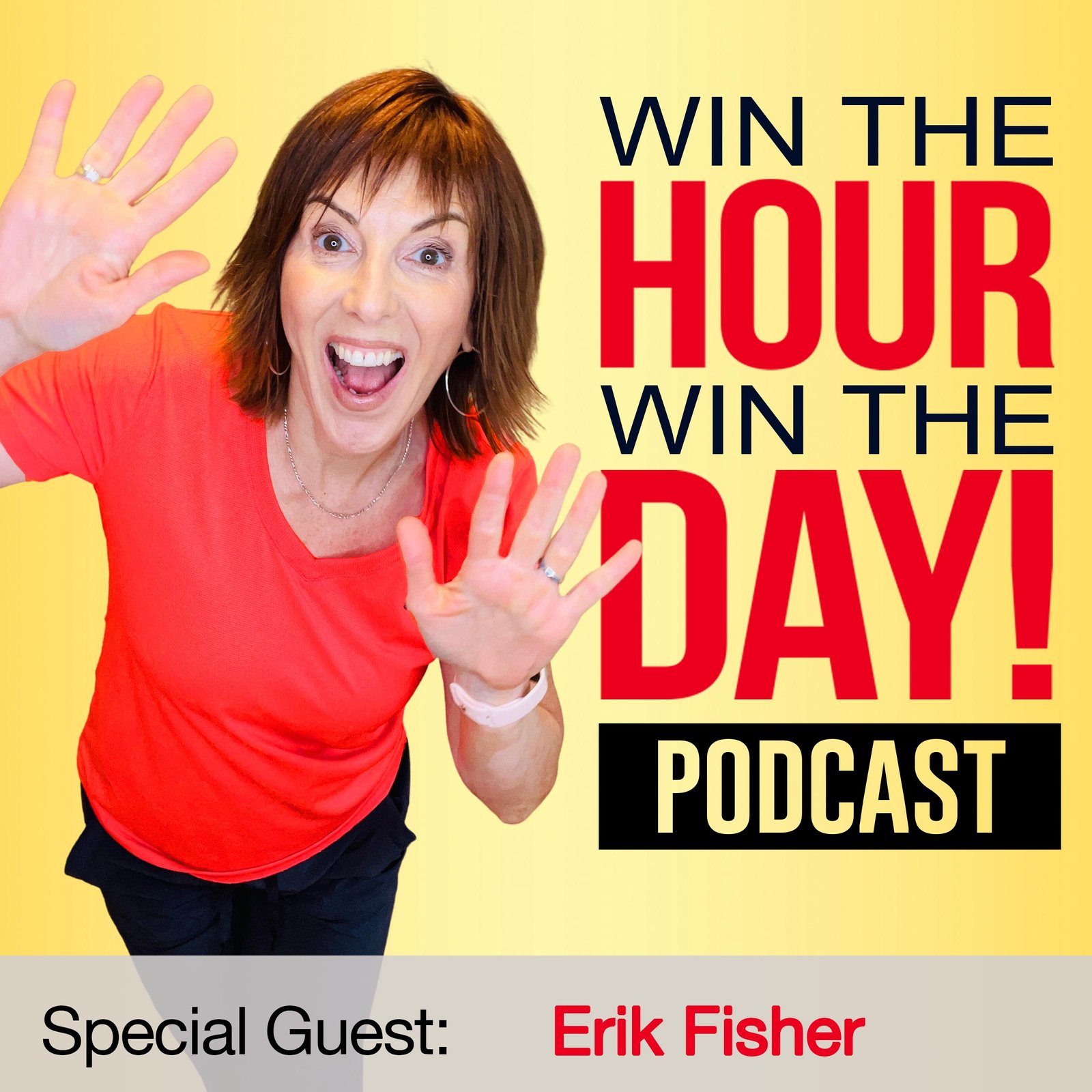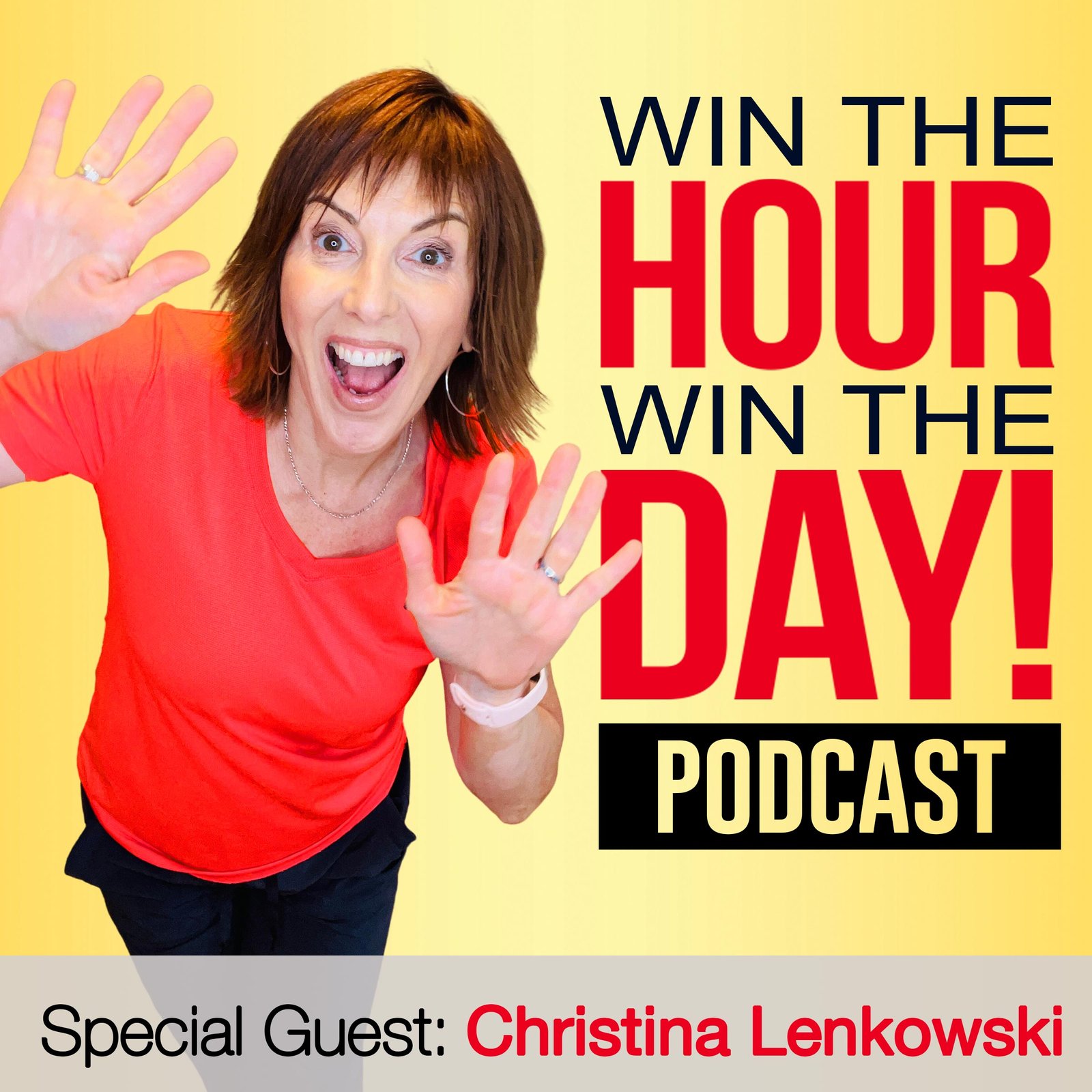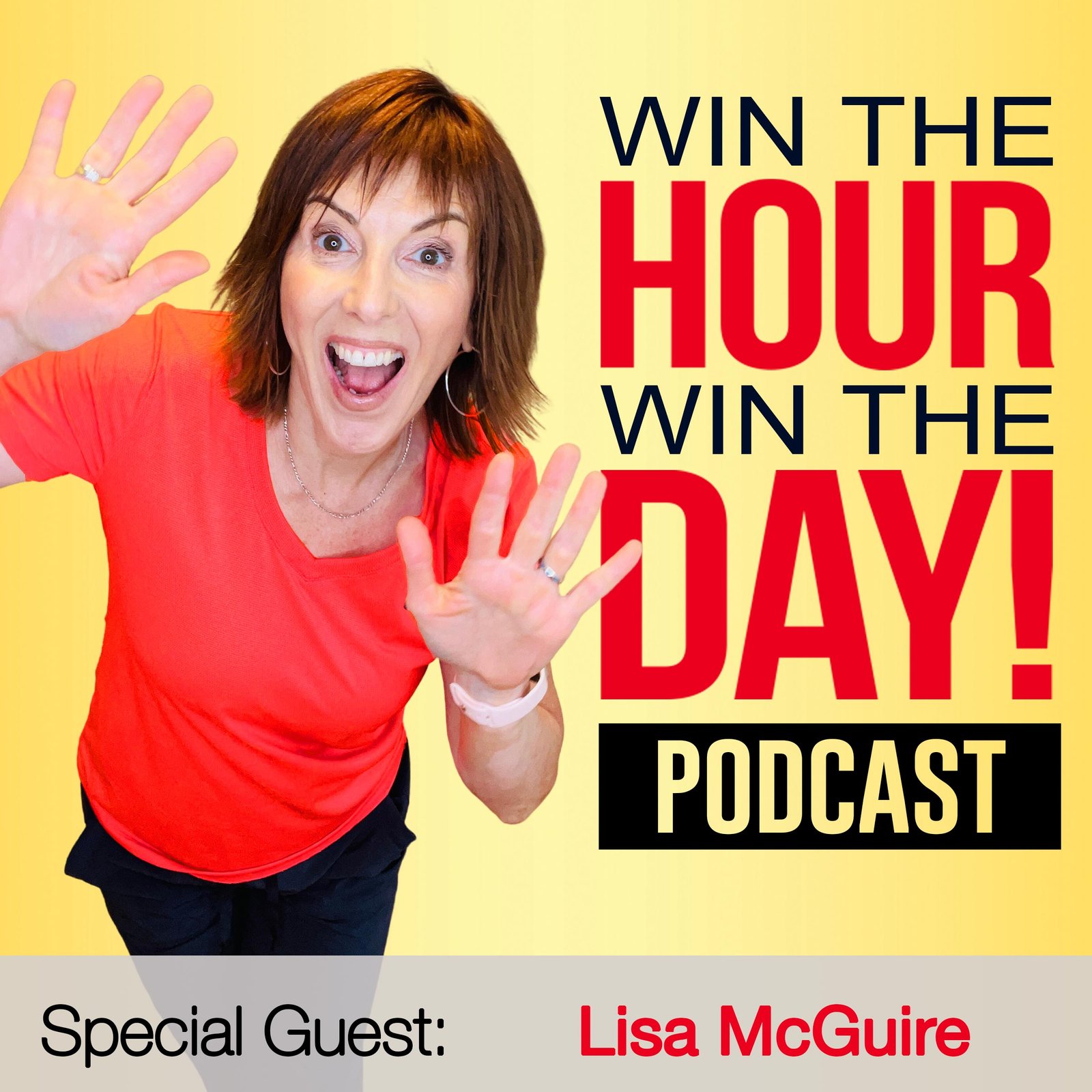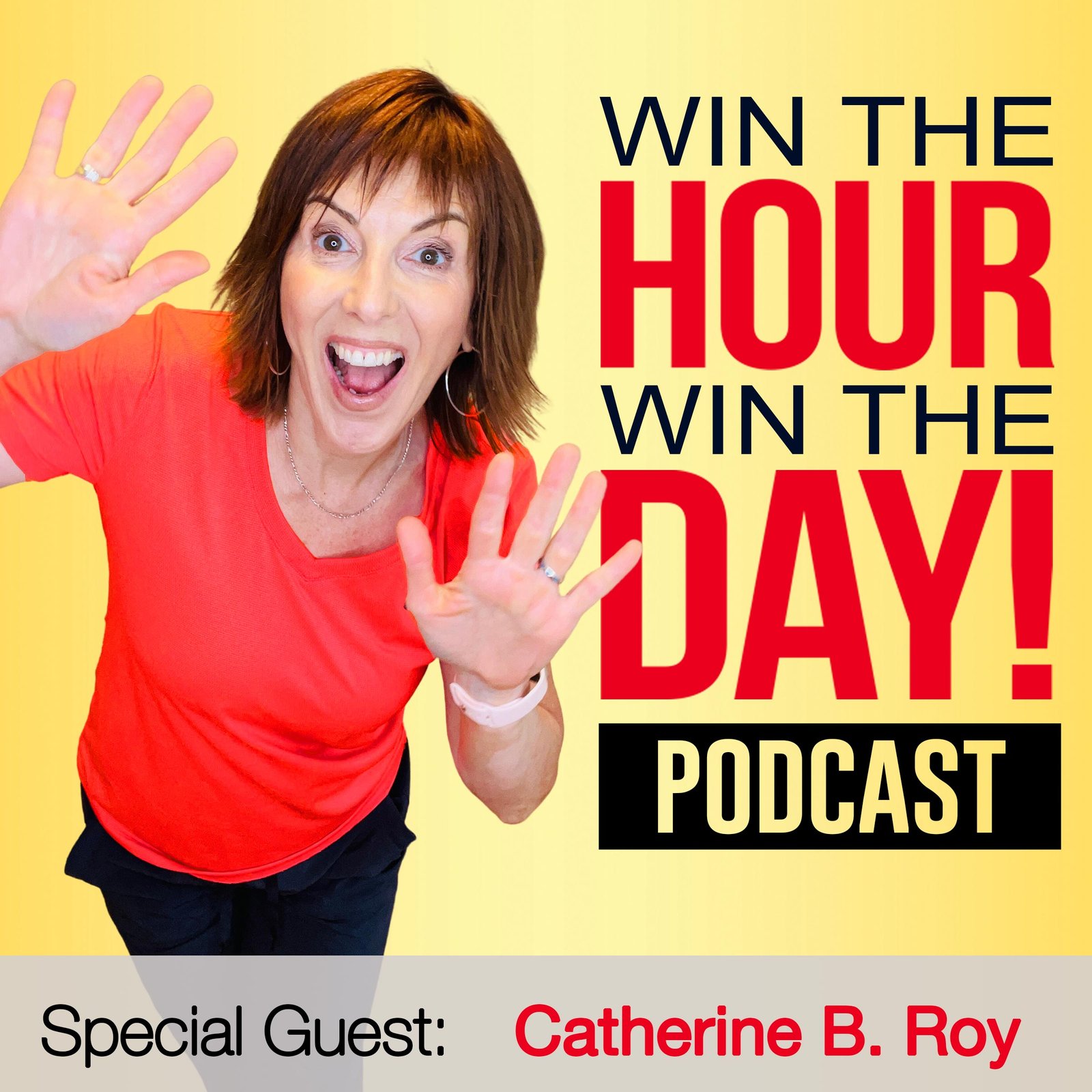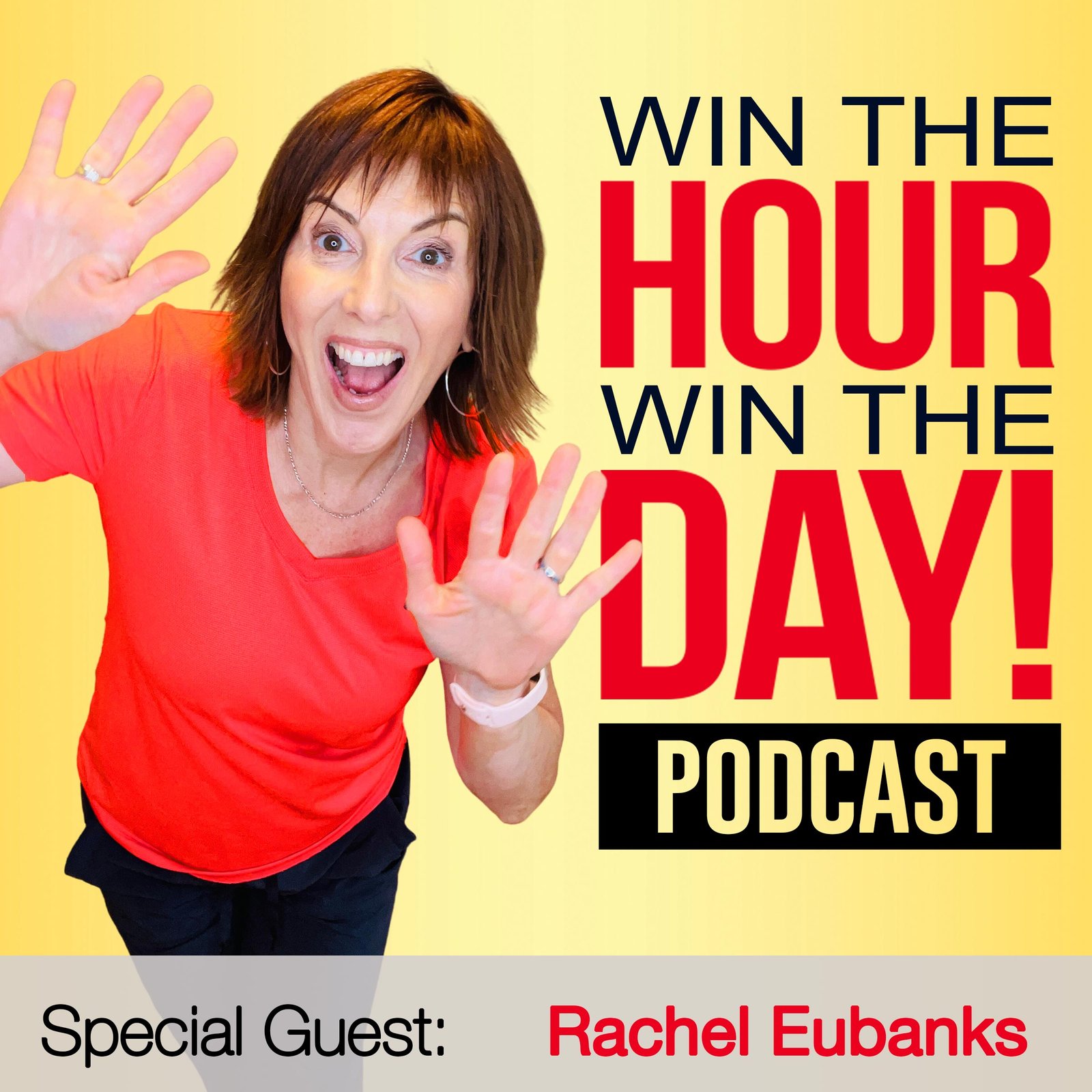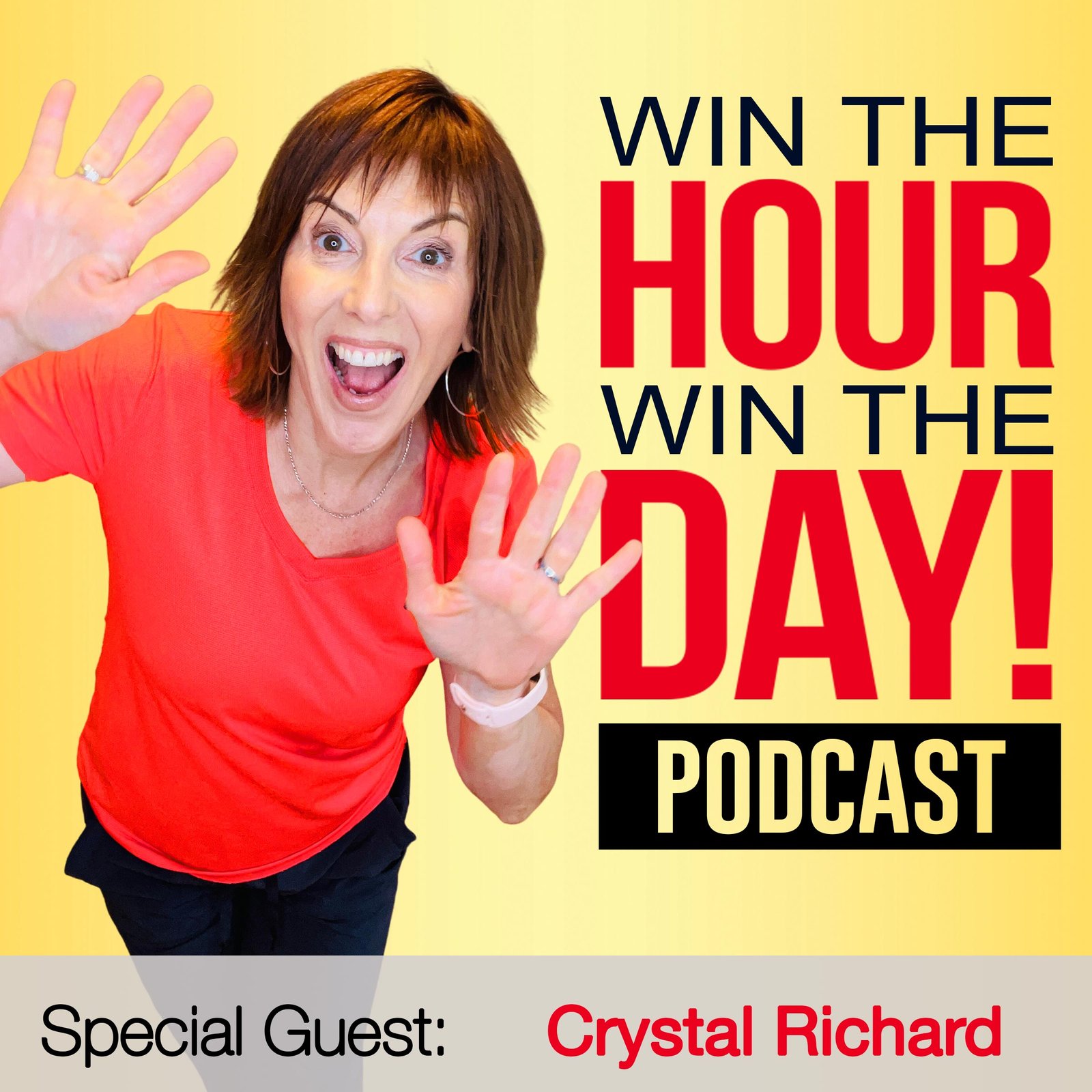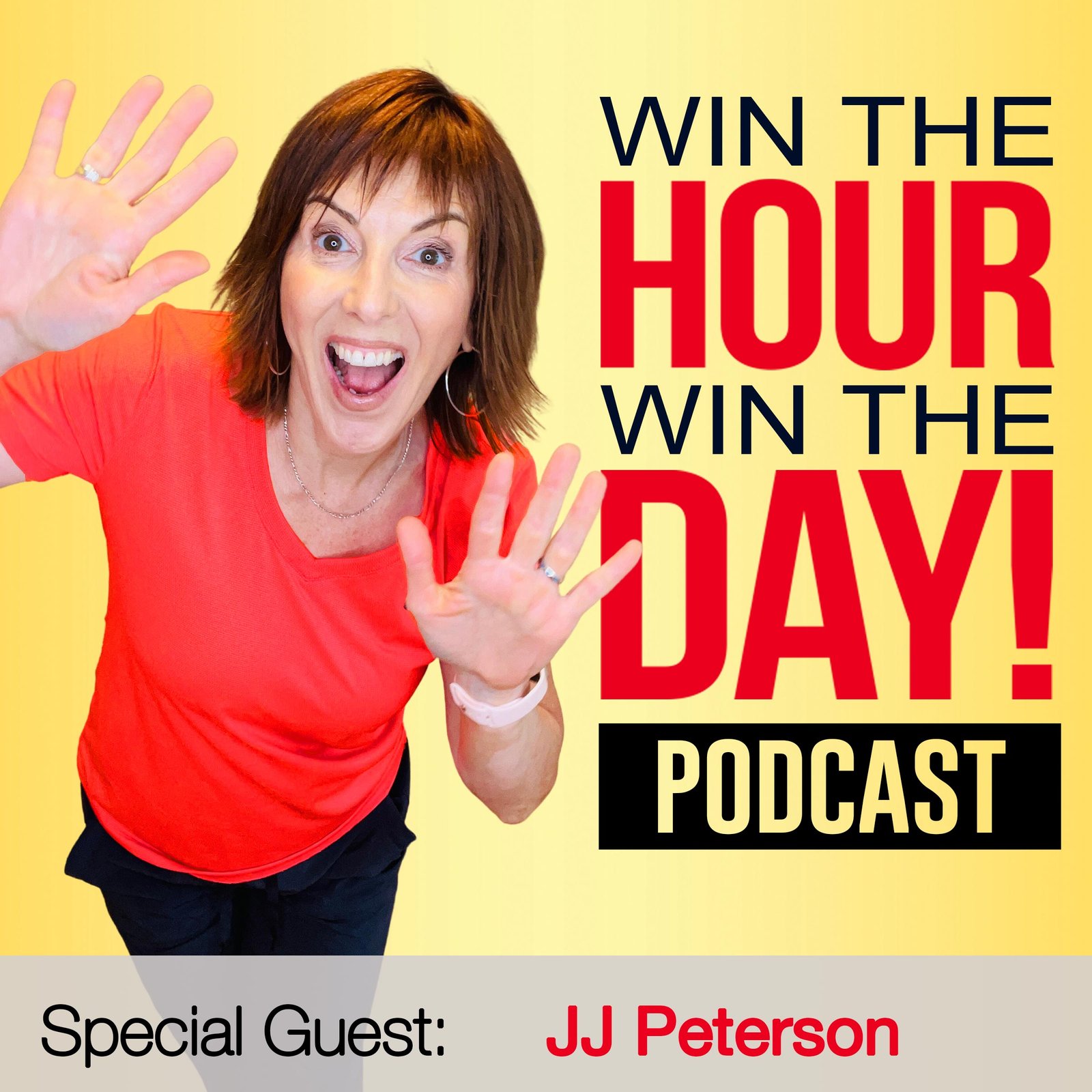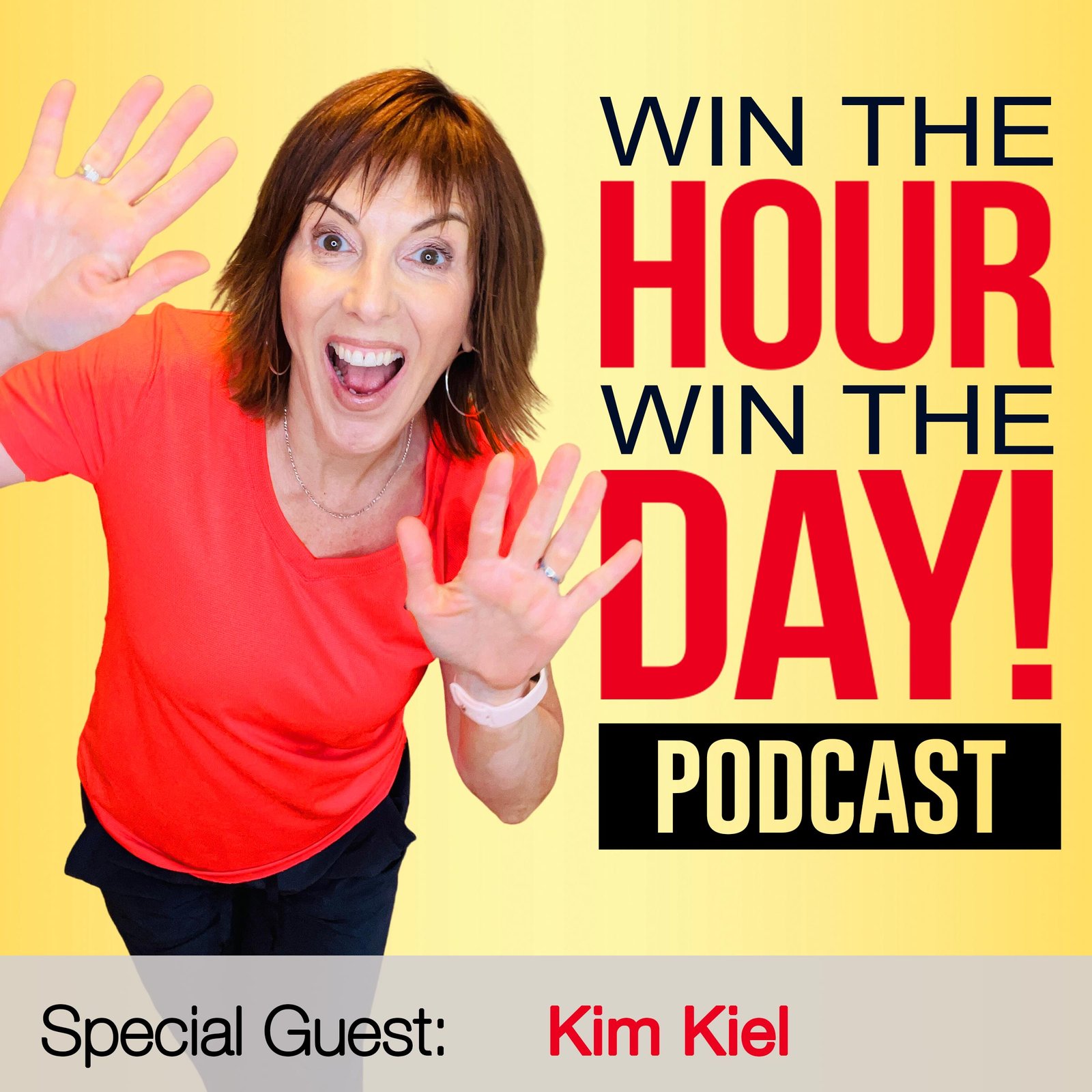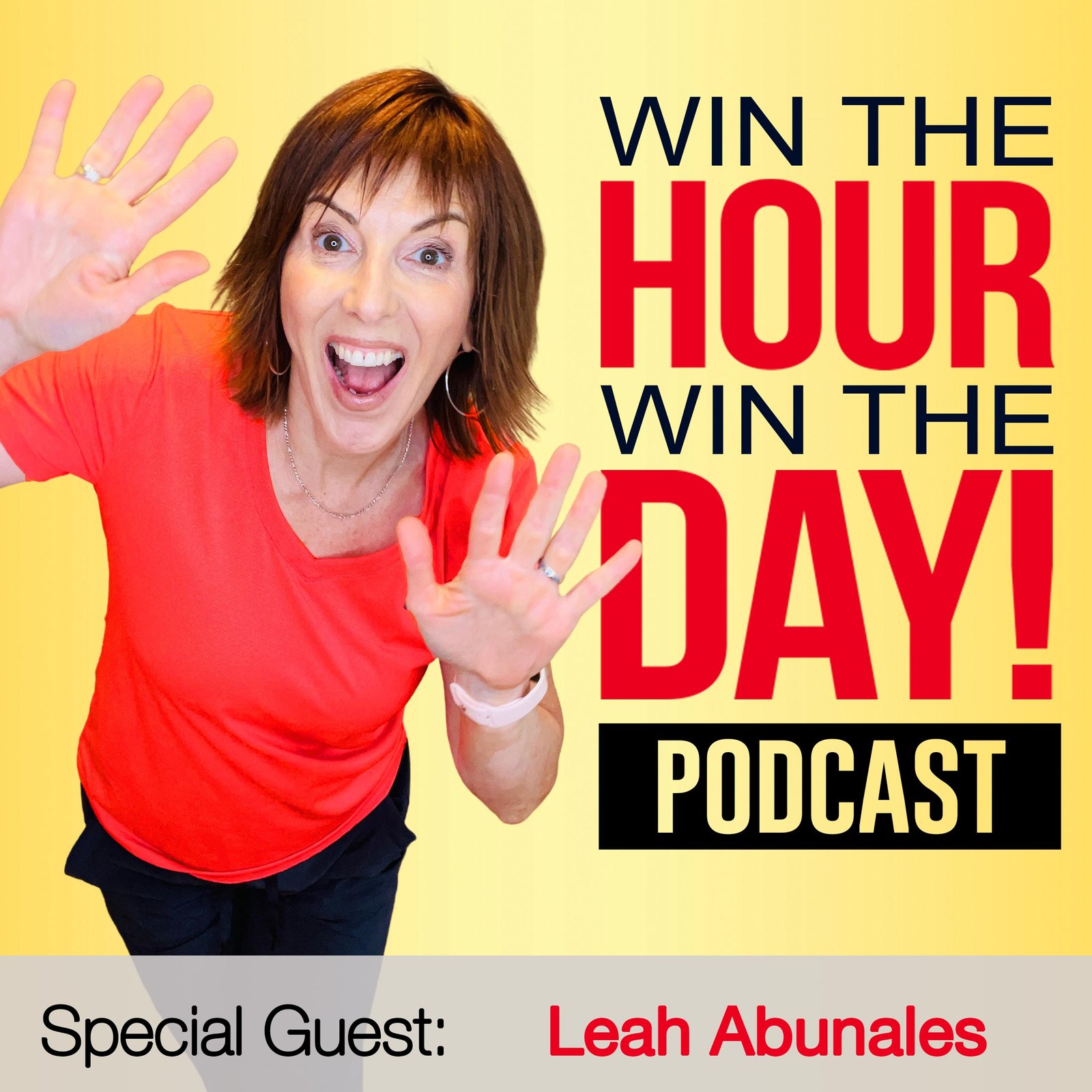Episode Summary This week’s episode of Win The Hour, Win The Day Podcast is...
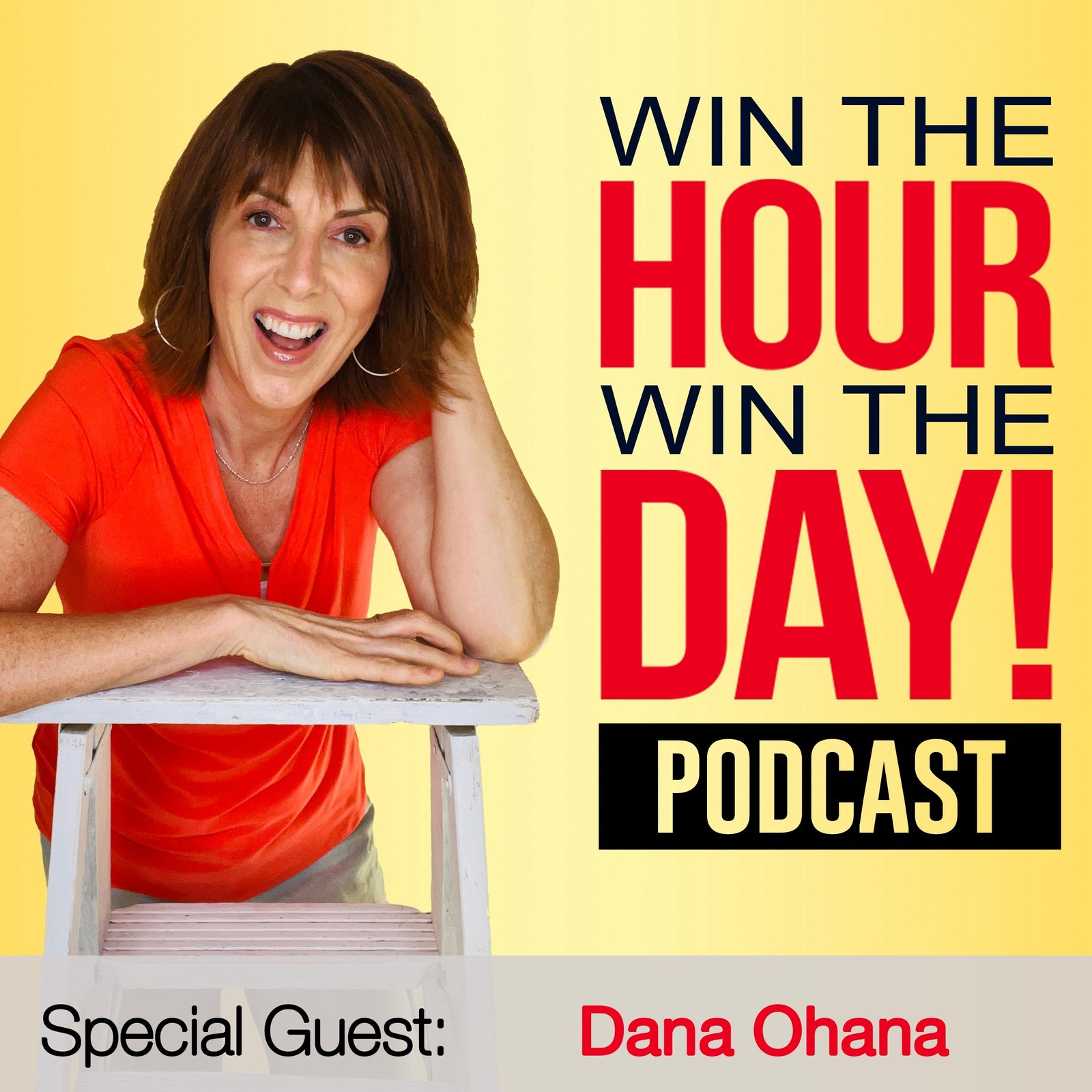
Are You Ready For Your Next Big Win?
Know your entrepreneur personality and I’ll take it from there!
Recent Podcast Episodes
Preventing Burnout with Smart Work Tools! with Kris Ward
Episode Summary This week’s episode of Win The Hour, Win The Day Podcast is...
Master Social Selling: Heidi Medina’s Strategies for Engagement
Episode Summary This week’s episode of Win The Hour, Win The Day Podcast is...
Boost Productivity and Master Storytelling! with AmondaRose Igoe
Episode Summary This week’s episode of Win The Hour, Win The Day Podcast is...
Master Video Marketing: Top Tips for Entrepreneurs with Dan Bennett
Episode Summary This week’s episode of Win The Hour, Win The Day Podcast is...
Boost Your LinkedIn Strategy with AI Tools for Enhanced Productivity! with Joe Apfelbaum
Episode Summary This week’s episode of Win The Hour, Win The Day Podcast is...
Mastering Personal Branding with NLP Techniques! with Olesija Saue
Episode Summary This week’s episode of Win The Hour, Win The Day Podcast is...
Innovative Lead Generation and Email Automation Secrets with Jennie Wright
Episode Summary This week’s episode of Win The Hour, Win The Day Podcast is...
PR Strategies for Diverse Entrepreneurial Impact! with Jennifer Singh
Episode Summary This week’s episode of Win The Hour, Win The Day Podcast is...
Convert More Clients on LinkedIn with Richard Moore
Episode Summary This week’s episode of Win The Hour, Win The Day Podcast is...
Master Business Growth on Pinterest with Meagan Williamson
Episode Summary This week’s episode of Win The Hour, Win The Day Podcast is...
24/7 Sales Boost: Video Marketing Secrets with Alex Sheridan
Episode Summary This week’s episode of Win The Hour, Win The Day Podcast is...
Master Public Speaking Tips with Nausheen Chen!
Episode Summary This week’s episode of Win The Hour, Win The Day Podcast is...
Beating The Burnout With Connie Whitman’s Success Story
Episode Summary This week’s episode of Win The Hour, Win The Day Podcast interviews,...
Craft Your Social Media Content Strategy With Shannon McKinstrie
Episode Summary This week’s episode of Win The Hour, Win The Day Podcast is...
Boost Your Productivity with AI Tools: A Deep Dive with Erik Fisher
Episode Summary This week’s episode of Win The Hour, Win The Day Podcast is...
Boost Visibility: Repurpose Content and Leverage Podcasts With Christina Lenkowski
Episode Summary This week’s episode of Win The Hour, Win The Day Podcast is...
Master Personal Branding & Storytelling with Lisa McGuire
Episode Summary This week’s episode of Win The Hour, Win The Day Podcast is...
Boost Business on LinkedIn with Catherine B. Roy’s Strategies
Episode Summary This week’s episode of Win The Hour, Win The Day Podcast is...
Scale Your Business: Optimizing Virtual Assistant Services with Kris Ward & Rachel Eubanks
Episode Summary This week’s episode of Win The Hour, Win The Day Podcast is...
Affordable PR Mastery: Crystal Richard Unveils Modern Techniques
Episode Summary This week’s episode of Win The Hour, Win The Day Podcast is...
Mastering Business Storytelling with JJ Peterson’s Guide
Episode Summary This week’s episode of Win The Hour, Win The Day Podcast is...
Revamp Your About Page: Guide to Personal Branding
Episode Summary This week’s episode of Win The Hour, Win The Day Podcast is...
LinkedIn Mastery and Video Marketing Secrets with Alex Sheridan
Episode Summary This week’s episode of Win The Hour, Win The Day Podcast interviews,...
The Systems and Processes Playbook: Insider Secrets to Streamlining Your Small Business with Leah Abunales
Episode Summary This week’s episode of Win The Hour, Win The Day Podcast interviews,...
How To Master Social Media Marketing To Get Conversions! with Dana Ohana
Episode Summary
This week’s episode of Win The Hour, Win The Day Podcast is sponsored by Win The Hour, Win The Day’s Signature Coaching Program the Winners Circle. Kris Ward who helps entrepreneurs to stop working so hard interviews, Dana Ohana
Dana Ohana opens our eyes to the bigger picture in social media marketing.
-Learn how to drive audience action effectively.
-Discover the power of diverse and targeted content.
-Master ninja tricks to leave a lasting impression.
And much more!!
WIN Back Time Quiz
http://winbacktimequiz.com/
Win The Hour, Win The Day! www.winthehourwintheday.com
Podcast: Win The Hour, Win The Day Podcast
Facebook: https://www.facebook.com/winthehourwintheday/
LinkedIn: https://www.linkedin.com/company/win-the-hour-win-the-day-podcast
Win The Hour, Win The Day Winners Circle: https://winthehourwintheday.com/winners-circle-masterclass
You can find Dana Ohana at:
Website: https://www.big.consulting/
LinkedIn: https://www.linkedin.com/in/dana-ohana-58204b52/
Instagram: https://www.instagram.com/big_consulting_/
Podcast: https://podcasts.apple.com/au/podcast/big-brander-journey-with-dana-ohana/id1560054867
Win The Hour Win The Day
https://winthehourwintheday.com
Dana Ohana Podcast Transcription
[00:00:00] Kris Ward: Hey everyone. Welcome to another episode of Win The Hour, Win The Day. And I am your host, Kris Ward. And today we have Dana Ohana in the house and she is a marketing and social media expert.
[00:00:10] And we’re going to dive into how to connect with your audience. Now, listen. I know this topic comes up a lot and it’s oh, they say generic things like be engaging, be entertaining, whatever. Does that mean and how can it help us? So let’s get to it, Dana. We’re here all on this show Win The Hour ,Win The Day. First of all, let me welcome you to the show. Hello. I’m so glad you’re here.
[00:00:33] Dana Ohana: Thank you for having me. I’m super excited to be here.
[00:00:35] Kris Ward: Okay, so we are all about big results, no fluff hair, tangible takeaways, so let’s cut to it. What is it we need to know about marketing? What are we missing? Where are the pain points? What do we gotta do to have a stronger connection to our audience?
[00:00:52] Dana Ohana: So first, I think the most important thing is to remember that people buy from people. Okay. And people buy from people. They can have a connection with someone they, they can actually build relationship with. Cuz if you build relationship, then you gain their trust.
[00:01:07] If you gain their trust, they’re gonna be loyal to your brand and your best brand ambassadors. And that is something we really wanna focus on how we can actually build their relationship with our audience. So it’s not about reaching out. There’s a nice quote saying you don’t, it’s not about reaching out to 10,000 people that like your content.
[00:01:25] You wanna actually reach out even to a thousand people that love your content, because that’s the purpose. We wanna be able to convert them, our followers, to an actual client in order for us to do it. We want them to trust us. We want them to see that connection.
[00:01:42] Kris Ward: Okay. So I struggle with that one a lot. And what I do, what the struggle part is, hopefully people like and trust me, but where I struggle is when we talk about, sharing and being relatable and all this stuff, and I’m getting better, but with social media, anything I do, I get my head in work mode, like boom. And part of it is even in my personal life, like I can watch documentaries that I may you know I got hooked on Formula One racing cuz I watched the behind the scenes of it and I was so fascinated with the machinery of the business and one thing led to another. So even my free time, I’m thinking business cuz I find it fascinating. So then I struggle with what is my ratio? This whole, how much personal stuff do I put out?
[00:02:22] I’ve recently been passionate about rock climbing. Okay, great. I would normally have not shared that, but now I do. Okay, this is what I’m doing on my spare time, blah, blah, blah. But I don’t get it. When does it begin and end? When do I know I’m sharing enough and is sharing the thing that makes them trust us or is it sharing some stuff about my work experience and a difficult client? I don’t know where the sharing begins and ends.
[00:02:45] Dana Ohana: So I think it’s important first to understand that the important part is also understanding who the audience, okay. Okay. Once he knows your audience, you know where to find them. Yeah. How to engage with them and when to engage with them. Okay. Okay. And once you know that part, then you can actually come with your key message.
[00:03:03] With the key message is actually focusing on the problem that your audience is experiencing. Okay. So it’s all about understanding what are their challenges, like pain points, struggles, what is nagging them? Okay, that will get them okay to stop and wanna listen to more. And once you’ve got those two together, then you basically come and choose a content strategy.
[00:03:26] Now you have four type of content strategy that I think like it’s actually always good to do a mix between them. Okay, so the first one, it’s an educational one, which is the one you wanna educate your audience. You wanna give them tips, tricks, give them the information that they’re looking for, information that actually focus on the problem that they experience because you want them to eventually to look at you and say, okay, that person understand me, that person actually see me. He knows exactly what I’m going through now. Okay. And that’s more like you can build that relationship. Okay. The second content strategy is about inspirational and motivational. You wanna inspire them, you wanna motivate them.
[00:04:05] You want them to understand that yes, they’re going through a certain like struggle or a challenge. But it’s actually doable. They can actually overcome it. They can actually, succeed with us. So you wanna motivate them. So it can be, for example, on social media, it can be a type of quotes stories, which actually links me to the third content strategy, which is personal connection.
[00:04:26] Okay. Which is the partner, as I said, people buy from people. You want ’em to get to know you, the person behind that brand, cuz a brand is a story and you are that brand and you are telling that story. And I wanna get to know you. And here is the part where I believe that you need to really listen to yourself and what’s right to you.
[00:04:47] You decide how much you wanna share, you decide how far you wanna take it and when you wanna share it. So for example, if I look at my business, when I started my business, part of my why is because I lost my mom. She used to work in a bank for 30 years by the time she decided to have the her own business.
[00:05:05] It was like, pretty much like at the end when she got sick. And that’s something that pushed me to do it, but in the beginning I couldn’t share it.
[00:05:12] Kris Ward: Oh, sorry. You know what I So you’re my new best friend. I have to, I’m so sorry. I didn’t mean to jump in. May I finish? I’ll tell you why. Sorry.
[00:05:22] Dana Ohana: No, that’s fine. It took me time to feel comfortable to share it. Yeah. And I decided what exactly I wanna share with Yeah. Around us and through that I use it to share also about the things that are not so working. Cuz I know people look at me and say oh, you’re a marketing person. Yes, I did marketing for corporates, for big brands and stuff like this.
[00:05:40] So it’s easy for you. But no, it wasn’t easy for me to be in front of a video or listen to the sound of my voice or put a picture of myself. So I do share on that personal note, but I decide when and how to share it. I’m sorry you wanted to say something?
[00:05:55] Kris Ward: No, because that was the issue for me when I wrote the book Win The Hour, Win The Day it really became it spun out of my life where I had been pulled away from my business for about two years when my husband was diagnosed with colon cancer and when I returned after his passing, my existing marketing clients had no idea of my absence, and one thing led to another and they kept asking me how could you have been away?
[00:06:17] We didn’t know. And so under that, they started saying, could you work with us under that capacity so that I could get to my kids’ soccer games and all these things? And when I wrote the book, I had so many people that were just doing everything they could for me to tell that story. Kris, you have to tell that story, or you’re just another productivity person.
[00:06:35] And I was like you, I really didn’t wanna talk about it in the beginning. Mostly it wasn’t cuz it was sad and painful, it was because I didn’t want that to define him and it didn’t define me. It was such, there was just so much more to the story than that. And so I really struggled and it took a long time.
[00:06:51] And then what? So finally, I obviously I’m sharing it now. But I did also, you’re right, I had to con manage how could I share it? So sometimes, especially in the beginning when people would try to bestow a lot of sympathy on me and change the energy, I would say, you know what? Everybody has something that’s my something right now.
[00:07:07] So I had to learn how to keep the energy high because I wasn’t interested or comfortable with that kind of sympathy. So it was, and I thought I was the only person. They’re like, you have to share it. And so it’s really interesting to hear that you struggled with that too, because my aversion is the people out there that are sharing, too much, right?
[00:07:25] Like I, it’s just sobbing and painful in every drama in their life. And so then I go the other way of you don’t need to know anything because I’m just trying to yeah.
[00:07:35] Dana Ohana: Because you also think it’s something personal. You still need to deal with this. But I think that’s the thing like, if someone tells you to share it doesn’t mean you need to share.
[00:07:44] Okay? Yeah. You are the brand. You need to do what’s right for you. And before we started actually chatting now, we spoke about authenticity. Yes. And this is part of it. If I’m sharing something just because someone told me, share it. I’m not being authentic. Because I can’t share it from the right place. And that’s a huge difference.
[00:08:01] And you need to do things that are right for you. Cause if it’s not right for you, it actually looks like you are not really willing to do it, or you’re just trying to maybe share with me a soy story that I’ll Yeah. Pull you. And it’s not the purpose and it’s, again, it’s not about what you say, it’s how you say it.
[00:08:18] It’s how you share the story. And there’s lots of stuff that happened to me that I’m not even sharing because it’s mine. It’s my personal things, but maybe in one-on-one with my clients, then I feel more comfortable to share. That’s the balance you wanna find because you wanna do what’s right for you and not because someone told you.
[00:08:34] Kris Ward: Yeah. And I would get stuck. I sometimes I think, oh everyone says I should be doing it. I don’t wanna do it, so I’m trying to, whatever. So you’re right. That doesn’t make it, if you do it and it, you don’t wanna do it. You’re right. It’s inauthentic and it comes out painful cuz I have tried that as it works. Okay, so we’re talking about..
[00:08:51] Dana Ohana: I will first to the last strategy
[00:08:53] Kris Ward: oh, sorry, did, came the last one. My apologies.
[00:08:55] Dana Ohana: One more. Which is the..
[00:08:56] Kris Ward: Oh, I missed the last one we chatted. My apologies. We got educational, let me re let me revamp since I moved on. Educational, inspirational, personal connection, and?
[00:09:05] Dana Ohana: And the last one, which cannot be a standalone which is the lead generation, okay? Which is the one, for example, promoting like freebies, the events you do and things like that. And the reason for that, that it cannot be a standalone, cuz if we look at the way that people are making the decisions today. It’s based on something emotional. They wanna know that they can trust you. There are so many people out there that provide the same type of product or service that you’ve got and why for me to come to you.
[00:09:33] You need to build something so you cannot just come and sell people don’t like direct sales. And I actually wanna say to those that we need to remember that the way we think and the way we buy our products. It really changed. So if I look for a second about traditional way of marketing, people first used to think, then act and then fill something, which means, I know my fridge, my TV is broken.
[00:09:56] It’s logic. I go buy it. And then I start to feel, am I excited about this? Am I nervous about my decision? What type of emotion comes up? In today’s marketing, it’s other way around. We first fill something. Then we act and then we think, and I think the easiest way is to see it always. I look at commercials for moms, right?
[00:10:17] Yeah. To always make her feel guilt. Are you a good mom? Are you doing the best as you can for your kid? And as she feels so much pressure that she wants to be that best mom, because the one that looks on social media, so she goes by the product and then she’s was I actually making the right decision?
[00:10:31] Is it right for my baby? Yes or not? And that’s why you cannot do direct self. You wanna create that type of emotional connection with your audience, which that you can do by sharing a personal story. You can do by inspiring them like those two goes well together. By educating them and by educating them, you can also add something personal.
[00:10:52] Okay. Like you wanna teach ’em how to do things that are outside of the comfort zone. So share about how you push yourself to do things outside of your comfort zone, for example, and give them some actionable tips with that. So that’s a different way to look at why you create your content.
[00:11:07] Kris Ward: Okay, so with the clients that we deal with, they’ve usually been in business at least five years, and they’re working harder than they should be at this point in their journey, right?
[00:11:17] They’re still grinding it out, thinking the more output, the more input will give them more output. And so my clients in the witness circle repeatedly tell us that they get 25 hours back a week within the first month of working with us. But you are, and I’ve heard these, some of these pillars before there’s some that we’ve heard whatever and different variations.
[00:11:35] But I do, I’m tapping into it more so the person I have is on social media. They’re scrolling cuz I have to, or they need something quick. They’re hopping in out, they’re doing too many things at one time. All this other stuff. And we’re actually really exciting cause we’re, we’ve recently started to create these, what we call power personalities.
[00:11:52] Jugglerama, Sufferpreneur and we’re really gonna be speaking to that in our content. So I have two questions here. One is, I think too, now when I hear you tap into the emotion, I know that, I know the commercials that make you, they’re a dog can’t find its horse and then he finds a horse and they’re selling you beer.
[00:12:09] So I understand that, but often I think we forget to put that on ourself. So even what I’m making you realize is I always speak to the entrepreneur you don’t have to work this hard. And I’m trying to like, this isn’t about you, but I could also be tapping into a picture of how much, how many hours this week alone did you miss with your family.
[00:12:27] So I think instead of lecturing the entrepreneur, I also could be looking at it, coming at it from a different angle for that motion, right?
[00:12:36] Dana Ohana: Exactly, and I think that’s what like, also like a tip that I wanna share. If you actually wanna start creating that emotional connection, it’s always good to ask questions, right?
[00:12:46] Take that touch, that problem, that sensitive. Cause when you ask a question, people automatically need to answer. No one can leave a question not answered. Even if they answered only in their head, they’ve answered it. And if you, for example, come to a client, like when was the last time you were actually having a family dinner?
[00:13:05] Okay. When was the last time like, oh my God, I actually need to remember now. Or when was the last time? I don’t know. You did something for yourself. And again, it’s really depend on the business. So even if you’re selling a product, when was the last time you look in the mirror and you love what you see so you come with those type of questions that really touch that problem, that something that really makes them, and you speak through that, then it automatically create a connection, cuz that’s a starting point that you can say, okay. I actually don’t remember when I did this, or I don’t re like you have something in your head
[00:13:37] Kris Ward: or even when was last time you were truly relaxed. Cuz I remember being like one time when my business was new and I’m in the backyard, it’s a family event, we’re having a barbecue and it’s someone’s birthday. And I look around, I’m thinking cuz anything that wasn’t work was an interruption to work. And I’m thinking, did that child not just have a birthday?
[00:13:55] Why are we here again? So I would show up, but in my mind I’m like, let’s get this going. Let’s celebrate. Get the cake. Come on. If I get outta here, I could get a few more emails or a couple hours in let’s go. So you’re right. When was the last time you truly felt relaxed?
[00:14:07] That’s a great question. Okay, so these pillars, are we looking, I know it all depends on how much we are on social media, but are we looking ideally, if we could hit a pillar, do all four pillars every week?
[00:14:22] Dana Ohana: So it’s a mix of them. Okay. Okay. So when I share my content, you can create one post that actually combines even all four of them.
[00:14:29] Okay? Because you give them some tips, you’re sharing like a story on how you got this, and at the end you have a call to action, which I think a call to action is something super important when you create your content. And I know a lot of people think that like call to action. It means that you need to tell them, buy my product, buy my service.
[00:14:45] But it’s actually more a call to action. You invite ’em to follow you, you invite ’em to share this post. To save it, you need to tell people like you to guide him. You know when you have a baby and you fit him with a spoon and you bring it straight to his mouth. That’s what we need to do with our audience, with our followers, because we are exposed to so much content.
[00:15:05] So I can just take a look and like and like and like but don’t pay the bills. Okay. They don’t like, it’s automatically movement of a finger of just liking it.
[00:15:16] Kris Ward: Oh my God. We all know that. But that I, we, I think we need a bumper sneaker. That was well said. Yeah. Yeah. That’s nice. Thank you. You like me.
[00:15:24] It reminds me when I was in university and I was just a server, like a waitress in a restaurant and people would say “Thank you.” And I felt like saying, don’t thank me, tip me. Like I, I don’t need your thanks, I need your money. Okay.
[00:15:35] Dana Ohana: But it is cause they forget how much we exposed to so much content. Especially if you look at the younger generation, like my sister is way younger than me in our twenties and she was sitting here next to me and like for an hour she was just watching TikTok videos and not even like really watching the video, actually writing, like reading the comments. That’s the generation.
[00:15:54] So you wanna hook them and when you hook them, you do it by actually asking, speaking about something that’s really important for them, that they’re gonna stop and not just gonna do the, like that they actually will do something and you wanna guide them. So even if on your post, on the design, you write down, share and save it.
[00:16:12] Put it out there. Yeah. You need to tell people in a way what to do. Watch this video, click here, check my website, check my link in the bio. Do something. Tell them to do something because if not, it’s just okay, like. How many times we just scroll on our like, and like without even sometimes reading it, without even entering to the actual caption to read the content there.
[00:16:31] Kris Ward: Okay, so here’s the thing. I, first of all, I, you are very inspiring because you’ve almost made me excited to relook at my social media, where most of us, we just do it as chores. Okay, we gotta get it done, let’s get it done. So there’s that. And I do agree with what you said. I remember listening to a podcast in the middle of the podcast.
[00:16:50] He was saying, pull over and give us a comment on this right now. And so help me, God. I pulled over on the side of the road and thought, okay, I’ll, why am I doing this? This is this I’m driving. And so he asked for this thing to be commented on. I did. Having said that when you’re in LinkedIn or the other stuff and the scrolls is so hard I guess it, I guess when it’s at the bottom of the post, do you not feel it gets lost there?
[00:17:15] So even like shares, save or whatever is everybody just winds up like the credits going, oh, the credits are at the end. Do we even read that anymore?
[00:17:24] Dana Ohana: So one of the tricks that I do, and I would love to share it here, is that first I love to take like a certain hashtag, especially like in platform, for example like Instagram, and I take it and own it to my business.
[00:17:36] So if my, for example, my business is big consulting, so I like to use different hashtags around the “big”, so I’ll ask a question. And then I’ll answer and then I’ll write straight after. So I start the post with a question and then straight after, if you agree with me, write “hashtag big”. Yes. This way, my business name in it. And then I get a reaction immediately.
[00:17:56] Kris Ward: Oh, that’s a good tip. So I could be going hashtag win. Yes.
[00:18:00] Dana Ohana: Yes, exactly.
[00:18:01] Kris Ward: Okay. Okay. Okay. All right. Okay. At the top.
[00:18:05] So are you saying right at the top? So you asked the question, you agree with me? And then they have to read, cuz now you’ve asked a question. So now they have to read cuz they’re tempted to see do I agree or not agree?
[00:18:14] Because you have to now, right? Oh, that is it. Everybody pull over. Write that one down.
[00:18:19] Dana Ohana: Yeah. And now, give us the hashtag. Yeah. It’s like you want it. And that’s how I like to start my post with a post. Because you get them to stop for a second, then you ask them to do something if they agree with you or not.
[00:18:32] And then you give the actual tips or share the story or a mix of them. And at the end, of course, you again invite ’em to do something. But the invitation can also be on the design itself, or if you’re creating a video, because today’s short type of form of videos are very popular. So even in the beginning, you’re starting with a question, right?
[00:18:51] You started ” Did you know this and this? Let me know in the comments. “And then you start to share, and then you start to speak about whatever you wanna put out there. So it’s always to think, how can I engage with my audience? Okay, what I can do to get them to do something. Because if they engage with you, there’s a higher chance that you will be able to convert them from actual followers to actual clients, and that’s the purpose of it.
[00:19:17] And I think like one of the easiest example that you can actually see I think it’s in the industry of tarot readings. Okay. Sometimes what they do, they put you like a video with the cards, but they told you wanna actually know what those cards means. Just read a caption. So you really wanna know, now you need to click on reading the caption and you’re reading it.
[00:19:36] Okay. Or they’ll do like an affirmation like, “Write it down, tap it down.” So for example, if you do something around motivation that you wanna give people, give them affirmation and say if you agree with me, if you want this in your life, write it down in the comments. So it’s like different type of things that you can come with that surround your business.
[00:19:55] That it’s important to your audience. So even if there were times that I wasn’t asking on my type of content give me like, if you agree, give me the “hashtag of big Yes,” I would still get it. And then I’ll respond like with like “big yay. Hashtag big thank you hashtag” and I use it to get my business name in top of mind cuz that’s what you also wanna be in top of mind for your audience, you wanna become their go-to person.
[00:20:18] Yeah. You wanna become top of a guru for them. Like someone they know they can trust and they can come with a question. And that’s the beauty of it. Because I you said more.
[00:20:27] Kris Ward: Let me, lemme jump in. Hold on, let me jump in with the questions. Cause I think you’re really right and I wanna just unpack that for a second.
[00:20:32] So even something simple as boring and mundane is you’re 40 PE studies show again and again, multitasking. You are like 40% less efficient, right? You got attention residue, you got decision fatigue. So I could be telling that stat, but if I ask the question, I could be saying, did you know today?
[00:20:50] You wasted 40% of your energy, or you were, did you know you’re, did you know that you were 40% less effective than you could be today? So that would be asking the question, which would be a better hook than me just diving into my stats?
[00:21:03] Dana Ohana: Yeah. Cuz that can be the think, right? 40 percentage? Yeah. Wow.
[00:21:07] Kris Ward: And I don’t, and she’s not right. I wasn’t 40% less effective today. What does she have to say? What does she, so then they have to stay to prove me wrong. Even if that’s the option.
[00:21:16] Dana Ohana: Yeah. And you can also give them a list of the thing they missed out because they were like not busy with something. So you can come with and they’re like, oh my God, wait, I didn’t, wow.
[00:21:25] You wanna get them to think about it. Okay. And understand because as I said, we’re exposed to so much content out there. Okay. It’s not In the past that like you didn’t have social media, you see a flyer, you see something, a commercial. Yeah. Now it’s everywhere and everyone trying. You wanna stand out and I wanna say something because you said before about like the assignments of social media, and I always ask like about like people, and I always get the same answer, which is funny, and I’ll ask you and and the ones who watch, like listening to the story, you’re more than welcome to put it in the comments as well. Do you feel that you work for social media or that social media works for you?
[00:22:05] Kris Ward: Yeah. It’s a, for most of us, it’s a beast we’re constantly trying to feed.
[00:22:11] Dana Ohana: Exactly, and I think most people will answer, I work for social media. Yeah. And that’s the thing, you don’t wanna do that. If you ask me, social media works for me. Yeah. And I’m active on so many platforms and doing it in two different languages.
[00:22:24] And the reason is that I look at this as a freight platforms for me to put myself out there, to put my knowledge out there, to connect with people. And let it be. And when you release that pressure of like just how get more followers, how do I get more views? How do I get more this? It doesn’t matter.
[00:22:43] You are there to connect with other people and it’s not about the quantity of the people, it’s the quality of the people. And about the strong connection you create. And that’s why you wanna start a discussion with them, get to know them. Let them get to know you. That’s why I like the question part cuz you’re starting a discussion and treat that you’re also showing the algorithm.
[00:23:03] Wait, there’s something interesting here because I see people commenting, and that’s more than one comment. And then it automatically expose you to more. And it also, you need to remember that it takes time for you to learn about your audience, for your audience to learn about you.
[00:23:18] So it’s also gonna take time for the algorithm to learn the two of you and understand what’s right and how to connect the two of you to get there. And that’s why consistency is super important. So if you just did it from a different mindset of I don’t care. So what if I didn’t post like I was sick this week, so I didn’t post it a all the time as I usually do and stuff.
[00:23:38] And you know what? And I’m super fine. I didn’t force myself to do something and my audience accepted and he knows when he is got questions, I’m there because that’s the relationship I built with them.
[00:23:50] Kris Ward: I think with us, I mean we’re all about super toolkits and efficiencies and all that stuff. So this it’s all set up and it happens and we put it out there and we’re consistent, but it’s certainly the engagement could improve.
[00:24:02] And I think what I’m hearing from you is really, although I know the value of questions, I think in the past we’ve heard questions is like maybe a good hook, but it seems to be the backbone and the framework for everything that you do. So you’re like, okay, now, instead of me saying, oh my gosh, you’re grinding it out, you’re working too hard.
[00:24:20] It’d be like, when was the last time you truly felt relaxed? And then I could dive into something, a little bit of content, and then I could possibly ask another question. So I think that’s it too. It’s not just the question it’s bringing. The questions are like the waves on the ocean. There should just be more than one.
[00:24:38] Dana Ohana: Exactly. You can have more than one. Ok. You can have a topic of flow in this. Ok. So you can even start with an interesting fact. Something that will make them even feel uncomfortable and then straight after, ask them a question. Okay. So when you do cells and like in incorporate, also teach to create tension, not to be afraid from this, make them feel uncomfortable.
[00:24:59] If you shake the, like the boat a bit, they’ll for a second, it’s like I, for example, once did like for one of the big logic like chains and I came in, I said oh wow, you guys are doing amazing and drip butter. And I’m like showing them, wow, look at this and look at this five stars. And this said, and they’re like, so happy.
[00:25:18] And I’m like, but you know what? You’re suck at this and this, and look at what you got. But you know what? I’ve got a solution for you. Yeah. Then listen, I wasn’t even speaking about the solution from the beginning, and I think that’s something we also need to remember, and that’s why I said the lead generation, it’s not something that can come and stand alone.
[00:25:37] You wanna give them, it’s like when you go to the restaurant, they don’t give you now the starter, the main, the dessert all together at once. You slowly start, you get the bread basket. You maybe get like in some places I don’t know, a bit of a taste. And if you want, you take more and if you want, you’ll order something else and forget.
[00:25:54] And that’s what you’re trying to do with your content. You give them a bit of a taste. And you want them to want more. You want them to ask more. You build a community, and that’s the main thing. If you look at social media as a place to build community and not at a place like, oh, do I really need to post today? Oh, and someone told me I need to put first. You don’t.
[00:26:14] Kris Ward: That’s cause we don’t have the good techniques. So also too then if I was doing a case study or talking about a client and their success, I, the question would be something like, can I don’t, that’s not a good question, but can you relate to this or what would you have done or have you, I don’t know.
[00:26:27] I need better questions cuz those are two generics. If I was telling some story, but somebody working whatever insane hours and what, and now she took, I have a client, when I met with her, literally she said her like, she was taking medication to calm herself, to sleep at night and now she had a month off, without a cell phone.
[00:26:44] And she said not in a million years cuz she had thought she could do that. But I don’t wanna start it off with generic of whatever, would you like to do this or can you relate? So I have to come up with more enticing questions to get them to read it cuz nobody wants to read a case story, case study unless you hook them. Unless you make them a purpose for that.
[00:27:01] Dana Ohana: Exactly. And you wanna also give them, and when I say community, you wanna give them a safe place, right? Okay. And by you opening up a bit more and sharing something maybe personal, you are allowing them to feel safe. Belong. But it’s okay for me to ask a question cuz some people are afraid to ask question.
[00:27:19] You say even in school, right? Because they’re afraid to maybe that the question will be, sounds stupid. And then they always wait for that one person in the class to ask that question. And if not, they get stuck with no answer. So you wanna give them a safe place that they can feel that they can come and ask you in the comments on private message and all of that.
[00:27:38] And that’s why you wanna start that discussion because if I see you are there and you’re answering and you really see me and you listen to me, then I don’t wanna hear more from you, then I’ll start following you. And that’s the nice thing, cuz even today when I go to different, like networking, I was actually like in one, like two, like a week ago, and I had ladies come to me like, you don’t know me, but I know you.
[00:27:59] I follow all your stuff, but they don’t comment on my stuff and then I’d like in my stuff. But they’re reading all my stuff. And that’s another thing I want people to remember. Because we live in like a society that we expect everything to happen now immediately instant. Like we put a campaign, we put something, we get like everything happening now.
[00:28:18] But that’s not the case. It takes time. And that’s why I said in the beginning, it’s about building relationship, right? Because people wanna feel comfortable to come to you when they are ready, right? Not because you put the pressure on them. And that’s a huge difference cuz a lot of people will watch your stuff and they’d be very silent.
[00:28:36] They won’t say anything, but at the right time they know exactly who you are and you’ll be surprised. That’s why I call it like in sales you use the pipeline, right? Yeah. When you need to plan your pipeline, what’s gonna be your like upcoming like leads and opportunities and all that. Social media gives you a surprise pipeline.
[00:28:54] Okay. Yeah. And that’s how I love it. It’s like you can do something now and in a month from now, someone will reach out, listen, I’ve been following you for a while, and now I’m ready. And that’s why you wanna give them that place, a safe place that they know that when they want it, they can come and not because someone put pressure.
[00:29:11] And that’s the same as you need to look at your, the way you do social media. There’s no pressure. You do you. If you don’t feel uncomfortable to make a video, yeah, don’t make a video. There’s other solutions. If you don’t feel like posting today all good, nothing will happen. The most important thing you do you, you being true to yourself and on the same time you listen to your audience and that’s why I think it’s super important for people to check their analytics because this is one of the, like the most common mistakes that people do.
[00:29:40] They think marketing. It’s all about creativity and fire. Yeah. No, actually not. Yeah. When I work in corporate and marketing, I discovered that it’s all about the numbers.
[00:29:51] Yeah. It’s so check your insight. So use the audience you’re attracting, the gender, the age group. Check what type of content they like from which one you got. For example, on YouTube, more subscribers. For which one you got more reactions. Which one? They save more. If it’s for example on Instagram they, they shared more. Yeah. See and learn cuz your audience will tell you everything.
[00:30:13] Kris Ward: Yeah. A hundred percent. A hundred percent. Oh my gosh. So much wisdom. So many value bombs. This is awesome. Dana, where can they find more of your brilliance?
[00:30:22] Dana Ohana: First, thank you. But you can find me online. So my company is big.consulting, so that’s my website.
[00:30:29] Kris Ward: big dot – D. O. T?
[00:30:32] Dana Ohana: Big Dot. Yes.
[00:30:33] Kris Ward: Okay.
[00:30:34] Dana Ohana: Big.Consulting. And you can find me on pretty much, I think on all social media platform. I do have a podcast. I’m on LinkedIn, Instagram, TikTok, Facebook. You name it, like Twitter, Quora.
[00:30:45] Kris Ward: She’s out there. You find her. She is.
[00:30:47] Dana Ohana: That’s what, but that’s what I’m saying. I’m active on so many platforms.
[00:30:51] I manage an Facebook community in e Uber with thousands of people. So I do my content in both. And I don’t feel like I work for social media because I see it as oh, I’ve got something to say today. Yeah, I’m just gonna share it. I just put myself out there with what’s right for me and that I know that my audience will find as valuable.
[00:31:08] And I ask them, you can create polls and ask them, what do you like me to speak about more? What do you wanna learn more from me? Get them to be active.
[00:31:17] Kris Ward: Everyone, please share this show with a business buddy, cuz we shouldn’t be struggling alone. And there’s lots of amazing content here that will really just open it up so that we’re all just more excited about social media, and we also very much love your reviews. I read every single one of them. So thank you so much and I will see you in the next episode.

